#he went from nonfiction books to fiction books
Text
Excerpts from Ze's NY Times interview
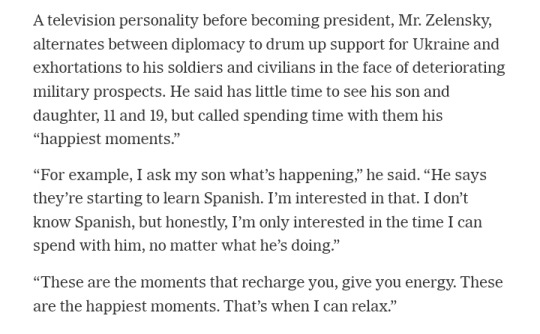
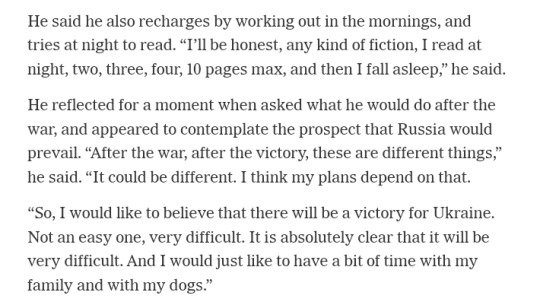
#🥺🥺🥺🥺🥺🥺🥺🥺🥺🥺🥺🥺🥺🥺🥺🥺#he misses his fam so much 😭❤️❤️❤️❤️❤️❤️#interesting that Kyrylo is learning spanish#so its russian Ukrainian english and now Spanish#so ze is now learning english with sasha and Spanish with Kyrylo 😄#the part about him being so exhausted he can only read 10 pages max because he falls asleep 🥺🥺🥺🥺🥺🥺🥺🥺🥺#also now its fiction he reads#he went from nonfiction books to fiction books#probably a much lighter read#it somehow always hits deep in the heart that ze no longer makes plans for his future after the war#we went from vacation and sitting by the sea and drinking bear and fishing with kyrylo to ... nothing and lets see and who knows#i cant help myself but this gives a weird feeling#almost like he doesnt expect to be still be there when victory comes?!#i dont know just ... interesting ... that this changed so much#well at least he could say at the end he wants time with his family and dogs ❤️#so dogs...they must have gotten a new one then#or sasha and Kyrylo adopted one of the guard dogs 😄
6 notes
·
View notes
Note
top ten non-fiction (general) books and top ten history books?
Naturally, whenever I volunteer to talk about books, I completely forget everything I have ever read, but we'll try to overcome this. Since it is impossible for me to pick them from all-time, I'll do this list from what I have recently read and enjoyed, including both nonfiction and history specifically since most of these fit that bill somehow:
Society of the Snow by Pablo Vierci. Just finished this last night, and it's the source material for the Netflix film of the same name, of the 1972 plane crash of an Uruguayan rugby team in the Andes and their incredible survival odyssey. If you've seen the film, you know how harrowing and also incredibly moving it is.
Pretty much anything by David Grann, including The Wager, Killers of the Flower Moon, Lost City of Z, etc. The Wager is his newest one, though people may have heard of Killers of the Flower Moon, but they're all good. He's up there with Erik Larson as one of my favorite writers of utterly gripping and novelistic nonfiction.
Speaking of Erik Larson: pretty much anything by, including Dead Wake, The Splendid and the Vile, In the Garden of Beasts, etc. Most people will have heard of and/or read Devil in the White City, but his other stuff is equally good. His newest, The Demon of Unrest, is a bit slower than some of the others IMHO, but it's also about the beginning of the Civil War and the crisis at Fort Sumter and is important reading in our current perilous moment.
Challenger: A True Story of Heroism and Disaster on the Edge of Space by Adam Higginbotham. A forensic and incredibly detailed history of the Challenger space shuttle disaster in 1986.
A Travel Guide to the Middle Ages, by Anthony Bale. This is an entertaining and readable introduction to mobility in the Middle Ages: who traveled, where they went, what they thought, and how they reacted and wrote about the other cultures they encountered, from both east and west. Definitely a good entry point for the layman who has heard the "medieval people never traveled/went anywhere" stereotype and knows it's wrong, but wants to know more HOW.
Into the Silence: Mallory, the Great War, and the Conquest of Everest by Wade Davis. Another incredibly detailed doorstopper history book that reads like a novel, exploring 19th-century British imperialism in Asia, the race to climb Mount Everest, the Great War, and more.
Emperor of Rome and SPQR by Mary Beard. These are both incredibly accessible starting points for studying Rome, written by a renowned classicist with a knack for making her historical material and concepts easy to understand and entertaining. Don't be put off by the length of either of these, as they read easily.
The Wide Wide Sea and The Kingdom of Ice by Hampton Sides. The former is his newest book, about the last voyage of Captain Cook, and the latter is my favorite of his other books, about the 19th-century USS Jeannette polar expedition. He is a writer of incredible skill, thoughtfulness, and detail in handling subjects of empire, exploration, colonialism, maritime history, and adventure.
Empire of Pain: The Secret History of the Sackler Dynasty, by Patrick Raddon O'Keefe. A compelling, disturbing, mesmerizing, and infuriating account of the Sackler family, the creation of OxyContin, and the opioid epidemic in America.
Master Slave Husband Wife, by Ilyon Woo. Now, this one is a bit cheating since I haven't actually read it yet (it's on hold at the library), but it's won the Pulitzer Prize for history so I'm fairly sure it's going to be good. It's about 19th century slaves-turned-abolitionists William and Ellen Craft and their race- and gender-bending journey to freedom and anti-slavery activism.
96 notes
·
View notes
Text
interruption | arthurtv
hello!
not very good as following a routine or any kind of schedule so the posting of my writing will be rather sporadic... i do apologise but bear with me on that.
here's one that i've been working on for a couple of weeks, from a request that was sent in to my inbox, so i hope that whoever did ask me to write this enjoys it. let me know what you think and don't hesitate to send in your feedback or send in any ideas that you want me to write.
thank you! love to you all!
enjoy. x
*
Cosy.
That’s how she would describe Arthur’s flat.
Cosy and very him.
All open plan, with his kitchen melding with his living room mixing with his dining room, but so warm and inviting. A knitted throw-blanket folded and draped over the back of his sofa, that he always said was for show but he never scolded YN when she unravelled the fabric and threw it over her legs when she was curled up beside him, or took it to his bedroom when the nights were too cold for just a duvet and his radiating body heat. Books, labelled from fictional titles to nonfiction titles and autobiographies through to encyclopaedias sat on shelves attached the the walls of his living room, with photo frames of him and his family and wax burners filling in the gaps that melted scents of cinnamon and spiced orange, succulents draped down and in witty plant pots that his friends would buy him for Christmas. Lamps in every corner of his main living space because he felt that the main lighting was much too bright, especially for evenings spent at home with a good book that he’d brought from the bookstore on his outing into the city centre, or too bright for an evening spent at home watching a television show he’d been recommended to watch by one of his friends.
Where her flat was more in the centre of London, closer to where she worked in an independent coffee house which definitely challenged the Starbucks and Costa’s that were close-by, she became used to the sounds of passing cars and honking taxis and the distant sound of the overground squeaking on the rails as it approached its destination. The hustle and bustle of tourists passing by the entrance to her flat complex, shops on her doorstep, in an area that was full of high-rise buildings and overlooked a park that she spent many of the summery days sat in, with a picnic from Waitrose and a good book and with Arthur, enjoying the time together. So being in the part of London that almost instantaneously switches off in the middle of the evening, once everyone had travelled home and everything had shut up shop for the night, felt almost peaceful to her.
She much preferred his living space to her own…but she was sure that it was the feeling of being in the same vicinity as him that warmed her more than being in the flat itself.
On the evenings he would film with Alex and George and Cam, for a Chaos Crew video that seemed to be in high demand, she found herself dillying around his home and finding things to do until he was finished for the night. If it wasn’t cooking them both a dinner to eat once he was done, it was reading something from his ever growing collection of novels; and if she wasn’t reading a book, she was logging into his Netflix and watching a film to pass the time and, if she’d had a busy day and felt her eyelids sitting heaving, she would curl up and take a nap on the sofa until she was woken up with a soft kiss to the forehead or a gentle nudge into her thigh to wake her up.
But there was something about that evening where she just wanted to be near him.
They’d both, surprisingly, had days off that coincided with each other so they spent the day together and they came rarely and not very often - taking it in their stride and making the most of getting to spend quality time together.They went shopping down the strip together and spoilt the other whenever they saw them looking at something for a little longer than normal, they popped into her coffee house for a cream cake and a coffee and to say hello to her friends who were working that day, they went food shopping because his fridge was a little scarce when it came to ingredients for a dinner that was substantial and they shared a late dinner together where they sat at the dining table with a candle and some fizzy apple juice to impersonate wine because neither of them fancied a drink that night. But she knew their time together was inevitable and she couldn’t help but look at the clock as she counted the minutes down till he said he needed to film a new video - and she couldn’t complain because, well, she had spent the last twelve hours with him.
But, twelve hours just didn’t feel like enough.
She hated using the word clingy when it came to her relationship with Arthur but… she felt clingy.
Across the space of his living room, she swerved the sofa and dodged his furniture and tucked the blanket a bit tighter over her shoulders as the gentle breeze of her movements blew it from the bare skin showing for her t-shirt - well, not her t-shirt but Arthur’s t-shirt, yet she claimed it as her own and he couldn’t say no to her when he thought she looked beautiful in his clothing - and she made her way down his hallway to. Goosebumps on her legs as she left the warmth of the sofa but they soon disappeared as she got closer to his office door, accustomed to the chill in the air.
“You know when this guy is telling him to tone it down that he needs to take it down a level,” she heard Arthur remark, a gentle snicker following in suit.
“Uh, yeah, looking a little bit like a geek there… might want to tone it down,” George’s laugh came next, followed by a chorus of cackles and snickers from the other guys sat on the Discord video call.
“He’s got a fourth badge that’s just homophobic,” her boyfriend retorted back and at that, she rolled her eyes and an unsure smile on her lips because of the emphasis on the last word of his sentence.
She could hear that whatever they were watching on Youtube had been unpaused, ready to carry on before they took another break to add commentary content to the video, and her hand halted over the door handle to his office. Shuffling on her bare feet, the wooden floor of his hallway was cold beneath the pads of her toes, and she just couldn’t figure out the right time to poke her head into his room and ask him just how long he was going to be. She didn’t want to be a bother but the longing-for-him feeling, that sat low in her belly, was becoming a bother to her.
“It is kind of cute. I actually do kind of rate it, like being your own superhero and that… but it is the kind of thing you grow out of when you’re like six,” Arthur stated.
“Yeah, you’ve got to go as something recognisable surely, right?” Alex questioned and there were some gentle hums of agreement throughout that she probably would have joined in with if they were all sat in a room together and discussing that specific topic, “if you’re gonna go as anything at all.”
“What did you go as to Comic Con?” Arthur wondered, asking the question that everyone was thinking; “I went as Obi Wan Kenobi,” came Alex’s response and he was instantly met with silence. YN could just imagine the smirks and the grins and the laughter that were almost bursting to come to light from the three guys sat there, taking in everything they’d heard.
And YN took the chance.
The door handle squeaked as she applied pressure and the door creaked as she opened it, poking her head into the room, met with the sage green wallpaper of his office and the dim lighting filling the space that he used as background lighting - because he still found his main light to be too bright when filming his Youtube videos. He turned in his seat and let his eyes adjust, smiling upon her arrival once he saw her full figure standing in the doorway, the screen illuminating the side of his face and he slipped his headphones from on top of his head and down to his neck.
“You okay, lovie?”
“Just wanted to know how long you were going to be,” she hummed softly, almost too quiet, but she didn’t want to interfere with their recording because then he’d have been there even longer than planned, “I was gonna have a nap on the sofa but I won’t if you’re not gonna be too long.”
“I won’t be long, no,” he said, “there’s not long left of this video. Give me twenty minutes?”
“I’ll wait up for you,” she smiled, “mind if I just sit in here and watch? Promise I won’t make any sounds. I’m a bit bored out there on my own.”
Arthur smiled warmly at her, letting his eyes wander up and down her body as he took in her comfy appearance, holding up his pointer finger as he turned back to face his monitors and slid his headphones back up his head, setting them back on his ears.
“Guys, YN’s here.”
She could hear the muffled cheers through his headphones from his announcement and she grinned shyly, tightening the blanket around her shoulders, and she closed the bedroom door behind her before shuffling across the carpet. He gave his thighs a pat, inviting her to come and sit with him for a brief few minutes, and she quietly took him up on that offer as she blushed and nodded. He situated himself a bit more comfortably in his chair, unplugging his headphones so she could hear what was happening and moving any lingering wires so she could settle herself down on his lap without pulling any screens off of his desk. Curling up under his arm and bringing her knees to her chest, covering herself with the blanket draped over her shoulders, releasing a content sigh. She wasn’t bothered by her appearance on the screen because she knew he wouldn’t include any of what was happening, without her permission, in the final cut on Youtube.
“How have you been, YN?”
“I’ve been good, yeah. Ready for a sleep but you guys just had to come first tonight,” she smirked, feeling Arthur’s hand tuck beneath the t-shirt hanging down her frame, his fingers tickling up her side in a relaxing and comforting manner, “I feel I haven’t seen you guys for weeks.”
“You haven’t actually,” George remarked with a hint of feigned annoyance, a similar smirk sitting on his mouth, “spending all your time with Arthur now, aren’t you? Taking him away from us. We’ll have to fight for custody.”
She rolled her eyes with a grin and dropped her head into the curve of Arthur’s neck and his jawline, inhaling softly and breathing in the faint scent of cologne still left on his clothing, his arms tightening around her.
He was warm.
So warm.
His hands wouldn’t leave her skin. His arm stayed tight to her waist and his fingers traced soft circles into her hip, just above the waistband of the knickers that dug into her skin, and his free hand kept in its place upon her knee and he gave her a squeeze every so often.
“I’m letting you have him this weekend,” she hummed, “Platform Roulette, no?”
“I only get him when he’s drunk and annoying,” George frowned playfully, “you get him when he’s all cute and soppy. One can only dream of that interaction, used to have it all the time.”
“YN’s cute and soppy also so they’re practically a match made in heaven,” Cam cackled and YN felt the heat creep up her neck and settle across the expanse of her cheeks, “look at you guys, it’s just adorable and it makes me feel sick.”
“Cam, oh my god,” Arthur laughed, “you guys suck.”
“We love you both really,” Alex smiled, “you know we do.”
*
honestly, ending a story just isn't my forte... i just hate every ending i write.
anyway!
if you got this far then thank you for reading. means a lot to me that you've reached the end. please let me know what you think and don’t hesitate to send me any ideas you may have for future fics. my ask box is always open so don’t hesitate to send anything in.
lots of love to you guys! thank you! xx
#arthurtv#arthurtv imagines#arthurtv fics#arthurtv headcannons#arthur frederick#arthur frederick fics#arthur frederick imagines#arthur frederick headcannons#chaos crew#chaos crew imagines#chaos crew fics
216 notes
·
View notes
Text
2022 Writing Income
It’s that time again – for fifteen years now I’ve been writing an annual blog post about my income as a writer. Money tends to be an uncomfortable, even taboo topic, but I think it’s important to help counter the myths that we’re all multimillionaires living in Glass Onion-style mansions. (Side note: If anyone wants to pay millions of dollars for my book, I’ll happily update this blog post from my private island mansion.)
Remember, every writer’s career is different, and I’m only one data point.
Prior Years: Here are the annual write-ups going back to 2007: 2007, 2008, 2009, 2010, 2011, 2012, 2013, 2014, 2015, 2017, 2018, 2019, 2020, 2021.
In 2016, instead of a personal income write-up, I did a survey of almost 400 novelists about their income.
My Background: I’m a primarily “traditionally published,” U.S.-based SF/F author with 15 books in print from major New York publishers. The first of those books came out from DAW in 2006. I have an agent, and have been with them since about 2004.
I’ve self-published a middle grade fantasy and a few short collections. I’ve also sold about 50 short stories to different magazines and anthologies.
I’ve never hit the NYT or USA Today bestseller lists.
I’m currently the sole parent of a teenager (at home) and a 22-year-old (at college). I have a day job that’s just over half-time, both for the paycheck and the benefits.
2022 in Summary: There’s no gentle way to say this. The last several years have kind of sucked. Losing my wife to cancer in 2019 completely derailed my writing. I was hoping 2022 would be a comeback year, but life had other plans…
I did write and sell two new short stories and one nonfiction piece, which was nice. I’ve got a finished middle grade book that’s been on submission for a while. I finished a standalone fantasy that’s been sitting with my publisher for a while.
Normally, my editor is pretty quick about responding, but last year wasn’t normal for DAW, either. DAW was acquired by Astra House. A lot of their time and energy went into that deal. I’m hoping for the best, but things still haven’t settled into the new “normal.”
Last year did see the release — finally — of Terminal Peace, the third book in the Janitors of the Post-Apocalypse series. I’m thrilled and relieved to see that book in print, but it came out right in the middle of the Astra House acquisition, which may have impacted things like promotion and publicity.
I also finished the first draft and started revising a new standalone middle grade fantasy with series potential.
2022 Income: The biggest check was the publication payment for Terminal Peace. All total, before taxes and various expenses, the writing brought in $13,957.16. While that’s absolutely nothing to sneer at, and I’m grateful for the success, it’s also a dropoff from the past couple of years. To be blunt, if you look at the cumulative graph, things have been slumping a bit.

Income Breakdown:
Patreon has been a small but steady and helpful source of income. My thanks to everyone for that!
As usual, my U.S. novels are the biggest piece of the pie. The short fiction category is a bit higher this year, thanks to those two new stories. I didn’t self-publish anything new in 2022, but if that middle grade book doesn’t sell, I’d like to publish that one later this year.
Novels (U.S. editions): $8,542.83
Novels (Non-U.S. editions): $473.25
Self-Published: $1158.24
Short fiction: $892.86
Audio: $521.04
Patreon: $1668.94
Other: $700
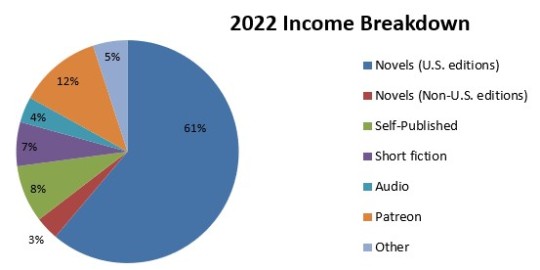
I mentioned earlier that things have been in a bit of a slump, and I need to focus on breaking out of that. Some things I can’t currently control. Tomorrow I could wake up to an offer from DAW on the book they’ve got, and maybe an email from my agent that the middle grade title he’s been shopping around went to auction and got a six-figure advance. But I can’t make these things happen.
Priority #1 is to keep writing. If I’m not doing that, other goals are pretty much moot.
Priority #2 is to figure out some alternate options. It may be time to put more time and effort into self-publishing as a complement to my traditionally published work.
The biggest thing making me anxious is that I’m pretty much out of contract. The paperback of Terminal Peace comes out this year, but for the first time in about 15 years, I don’t have the security, the luxury, or the deadlines of a signed contract. In some ways, this is freeing: I can write whatever I want. But there’s no guarantee as to when things will see print. Submitting to the traditional publishers is a long, slow process…
From talking to other writers who’ve been doing this a while, I’ve learned that pretty much every career has its ups and downs. Personal, pandemic, and publisher issues have been a bit of a perfect storm for me these past few years, but I’m not going anywhere. After 27 years as a writer, I’m excited to see what comes next.
Wrap Up:
I hope this has been helpful. As always, feel free to share the post and/or ask questions.
659 notes
·
View notes
Text
DID book Reviw - Identical by Ellen Hopkins
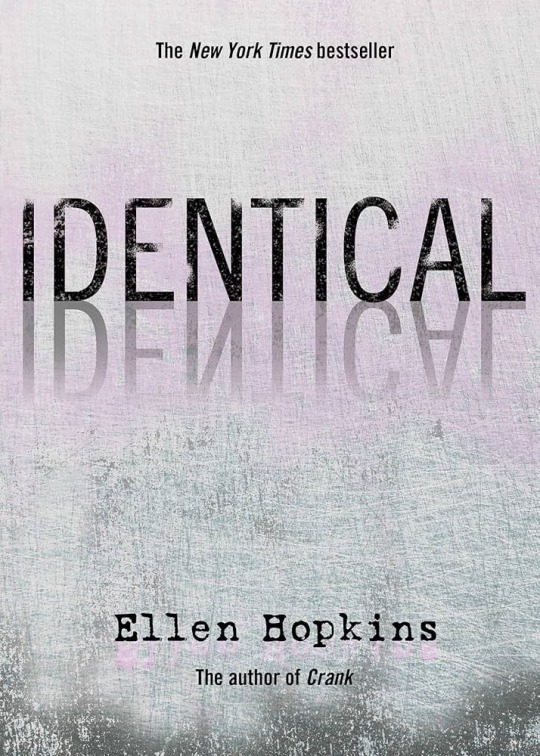
Facts:
Date of publication: 2008
Fiction or Nonfiction: fiction
Was there a diagnosis of DID? Yes, near the end
Was the person with DID presented as evil for having DID? No, just a flawed and struggling individual
Major trigger warning list:
Alcoholism
Drug use
Incestuous rape by the father (mostly non-explicit but implied enough to be obvious)
Lots more uncomfy incest things (kissing, wanting to see his daughter in attractive clothes/getting changed)
Denial from the mother
CSEM being made (mentioned much later and not very explicit)
Bulimia (lots of binging and purging)
Grooming by a teacher
Inebriated sex with fawning into it
A dubiously consenting BDSM scene? (Nonexplicit)
Self harm
Suicide attempt and idiation
Abusers being in positions of power
There may be more that I’m not remembering. Shits fucked.
Subjective Review(this is how I felt about it)
Personal triggering scale from 1 to 10 (1 being not triggering at all, 10 being a badly overwhelming experience that might cause personal harm): ???5-7? (Unsure if its very triggering or not because of my current sense of being disconnected from most things. Still its def not been the worst/most difficult ive read, and its not explicit)
Personal relatability scale from 1 to 10 (1 being unrelatable, 10 being OMG THAT’S ME!): 6
Personal avoidance scale from 1 to 10(1 being eager to get on with it, 10 being impossible to finish): 3 (extremely easy to just keep reading, part of its probably because of the easy format)
My interpretation of the media(Includes spoilers):
I went into this with trepidation because the cover looks like it would be an edgy triller type of book, so I was half expecting the evil alter trope. This is especially common when its ‘just two’ alters, because the assumptions are made around the ‘split personality’, which is a term thats usually used negatively, associated with evil alters or used as an insult, etc.
And it can sorta seem like that, especially on the surface premise of ‘one of them is ruining their life!!’, which is also how this book seemed the be advertised. Except.. neither of them are trying to ruin their life really, they’re both coping just as poorly as eachother, and surviving just as well as they can. Does that involve self destruction? Majorly, but I read it more as trying to do anything she can to get out of the situation she’s in.
the premise:
Kaeleigh and Raeanne are 16-year-old identical twins, who live the idyllic, picturesque american household: their mother is a politician rising through the ranks, and their father is a judge. They’re both incredibly well-respected and have a lot of reach in their community. Their family looks perfect on the outside..
But is not so pretty just inside. Both parents are alcoholic in their own rights, influencing their daughters to take after them to cope through living together. Mom’s barely home and never wants to be there when she is. And dad.. controls every aspect of their lives through his unpredictable temperament and drunkenness. He’s lonely and pathetic and feels beat down by his cold wife, so the only person he can turn to for comfort is his daughter(s)
Which he does, frequently. He’s been raping Keileigh since she was 9, after a near-fatal car accident that broke her mother’s ability to feel love. Since then he’s been using Keileigh in this sick, twisted way, and controlling her so she’d never get away.
Keileigh and Raeanne’s means of coping are intense, but they’re not as opposite to eachother as it may seem. Keileigh is binging and cutting and shutting down and fawning. She’s in denial and always has a sense of being crushed under the weight of her father’s control.
Raeanne purges and seeks out her vices in getting high and having risky sex with guys who will never love her or treat her right, the more dangerous the better. She fawns just as much as Keileigh actually, just in a more subtle ‘this is what I deserve anyway/it’s too late to say no’ kinda way.
Both of the girls use alcohol and pain medications as a means to get themselves to sleep or get through the day.
As the book goes on, and the election draws near, the intensity and frequency of the abuse is driving Keileigh and Raeanne further and further into their breaking point. They want it all to end already, especially when her mother wins the election and is fully out of the picture, and the grandparents start showing up mysteriously to uncover the past. Something they knew about, something the parents have tried so hard to hide.
It takes Keileigh’s suicide attempt to make Raeanne say enough is enough. She sneaks out to meet with her grandfather on her father’s side to learn the story of what happened to make her father this way. It turned out he’d been the victim of CSEM, and deeply traumatized from the abandonment of his alcoholic mother.
This diddddnt super help her crisis, Raeanne couldn’t have just gone back into it all. She attempts to escape at least mentally with one of her drug hookups Ty, who likes sex rough and forcibly consenting. The drug trip is hitting her badly already when Keighleigh’s boyfriend shows up, mixing her and Raeanne’s world. Everything all together is enough to fracture the heavy wall between the twins, and..
All along they were one person. Raeanne was Keileigh’s twin sister who died in that fateful car crash, and from the trauma of that and being raped so soon after, she split off an introject of her sister to be a step outside herself.
The sisters wake up in the hospital, having to stay until the drugs and the withdrawl wear off safely. She ends up telling the doctor about her symptoms and shes able to get diagnosed with Dissociative Identity Disorder.
But how do you go home after that? In memories that came back, it turned out that her mother knew all along and intentionally turned a blind eye. Nowhere is safe.
It turned out that the grandmother knew and was scared into silence by the father’s influences. She had witnessed sexual abuse long before the accident, making her turn to alcoholism to try to forget what she saw, to cope. She showed up in the end to make ammends, and Keileigh and Raeanne were able to go home with her.
The ending is bittersweet but hopeful. Six months in, the girls are getting therapy. They have a loving boyfriend who doesn’t know the whole story yet, but he’s endlessly supportive. The father put himself in rehab and basically out of reach of his daughter. The mother works in DC now, shes not really in the picture as much but that’s probably for the better.
-
For a story told in poems, there was so much that was said in so few words. It was really hard-hitting and felt like a realistic approach of what happens when you’re coping with incest, just how much isolation it entails, how much control goes into it.
Like I said before, the sisters are a mess. But she’s also 16 and still getting raped at home, and literally no one was there for her, or at least allowed to be there for her until nearly the end. It’s heartwrenching really, and the whole time I was going Yeah, of course they’re like this, what else can they do?? It hits just very very honestly, and I don’t feel like any of it was written with pure disdain for the victims in the story, even if the tone could be very dry and callous in the point-of-views.
The poetry was really good too. The ‘chapter ends’ where the switches were happening had a very distinct way of formatting it, so there were two poems on opposite pages using some of the same words, with the spaced apart words revealing the truth of what they were both feeling. It was a fun read and very very well executed.
I don’t remember if I’ve read from this author before, but I feel like she handled a story about DID and incest and coping really well. It’s not a light read, but I also couldn’t put it down.
What they got Right in my opinion:
Diagnosis of DID being called Dissociative Identity Disorder
The entire structure of isolation and power dynamics ensuring that incest could happen and not be spoken about felt scarily accurate
Loosing time was not always so black and white it seemed. Of course I’m just going off poems, but theres mentions of what the other twin is doing in reference to themselves (usually in Raeanne’s point of view)
Introjection of a real person felt very correct and not in some weird ‘the ghost of your sister lives within you’ kinda magical bullshit way. She is an introject. They dont use that word specifically but its really obvious
The fawning is so fucking real, man
Keileigh often feeling ‘miles away’ or spacing out frequently
Neither part was better or evil compared to eachother, they were both coping in very messy ways
The thing that got me to notice that it felt more like an alter thing than a sister thing was in this very subtle thing of, when Raeanne found that her ‘sister’ had started self harming, or had a suicide attempt, it wasn’t like.. a normal person’s level of concern like ‘oh my god i could loose my sibling’ as much as it was this almost callous way of treating one’s self the day after deciding to live or having a major self harm episode. Just sigh, clean it up, forcibly make yourself carry on. Am I making any sense? It just felt very much like taking care of yourself vs another person.
The ending not being sunshine and rainbows happy ending, everyone wins. Idk, if you read my review for Pieces of Me, you’ll notice I was pretty upset about the fact that everything worked out extremely well, over the top idyllic. When we all know that healing is actually really messy, its not comfortable, not everyone’s on the same page and not everyone can safely know about the DID always. This felt very real to me
What they got Wrong in my opinion:
I think having full blackouts to the point of having an entirely different life from one another is pretty rare(if its not let me know, ive not heard of this happening much)
Umm I was a little disturbed by one of the healing things she had to go do was apologize to the teacher for leaning into him showing Way Too Much interest in her. The only goddamn reason he didn’t go through with it was because they could be caught?? That is the teachers responsibility, is it not????? Am I being too tumblr??? Am i missing something here???
I did not super understand the logic of Keileigh’s at work but Raeanne is going and doing drugs. How are they doin that, or is she very quick? Just little attempts to hide the big reveal didn’t super make sense to me
Would I reccomend this to someone with DID to read? Yes! But carefully, and keep in mind all the TWs. You might find it very relatable and idk if thats a good thing or not
Just so you know, there is a lot to this book that I didn’t talk about, a lot of little traumas that stacked up into it getting heavier. I just couldn’t possibly write about everything, so bear🧸 in mind if you read it yourself
#dissociative identity disorder#did in media#bunnidid reviews#dissociative identity disorder fiction#dissociative identity disorder book#complex dissociative disorder#cdd book#cdd media
16 notes
·
View notes
Text
May 2024 Reading Wrap Up
I read 8 books in May and fully got through all the books I wanted to read this month, which makes me happy. My enjoyment was a big up and down throughout the month, but I'm overall happy with what I finished in May. I read mostly fantasy, with 3 nonfiction. I wrapped up 1 series and read a few new releases I have been excited about.
Let's get into it!
1.The Familiar by Leigh Bardugo 4/5 stars. This was an enjoyable new historical fantasy standalone, and I'm liking her adult works quite a bit. I enjoyed the early-modern Spain setting, including all the societal upheavals that Spain was going through during this time period. This novel feels like a Leigh Bardugo book, with characters, themes, and plots that appear in her other books. In general, if you consistently like Bardugo's works, then you'll probably like this one! Adult Historical Fantasy.
2.Brave the Wild River: The Untold Story of Two Women Who Mapped the Botany of the Grand Canyon by Melissa L. Sevigny. I read this on audio, and this was an enjoyable nonfiction about the first women to raft down the Colorado River in the late 1930s. Nonfiction.
3.The Winners (Beartown 3) by Fredrik Backman, 5/5 stars. This gave me such a satisfying but emotionally devastating conclusion 😭. I knew from page 1 that things were going to hurt, but I really couldn't have asked for a better series about a small hockey town. Fiction.
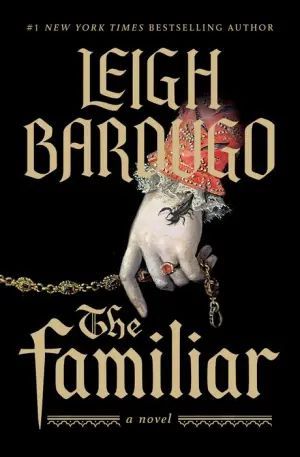
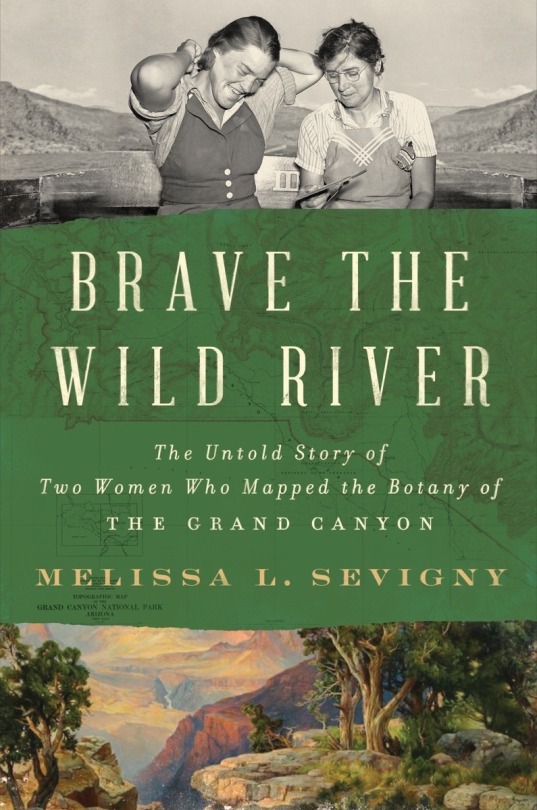
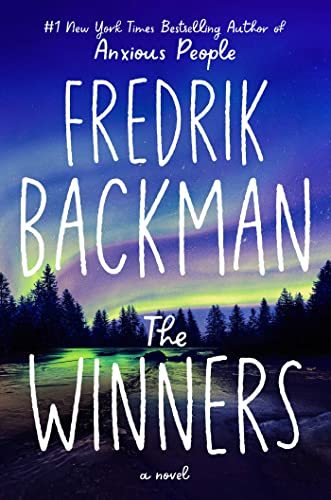
4.Song of the Huntress by Lucy Holland 2/5 stars. I read Sistersong when it was released a few years ago and loved it. I was disappointed with this however, I never really connected to the plot or characters at all. I felt like our main character never went through any sort of growth, and I was bored or frustrated throughout.Shoutout for having an ace main character, but other than that I would have dnf'd this book if it wasn't for how much I deeply enjoyed Sistersong. Adult Historical fantasy
5.The Language of Trees: A Rewilding of Literature and Landscape by Katie Holton. This was a lovely collection of short essays, musings, passages, and poetry about trees and forests.
6.The Hedgewitch of Foxhall by Anna Bright, 3/5 stars. I'd been interested in this novel since the title and fantastic cover caught my attention. Young Adult is generally not my favorite genre anymore, and this definitely had a YA feel to it, a bit more than I find I enjoy anymore. The ending felt cobbled together and rushed, but I thought this novel had some good reflections and critiques on nature and society that apply well today. Young Adult Historical Fantasy
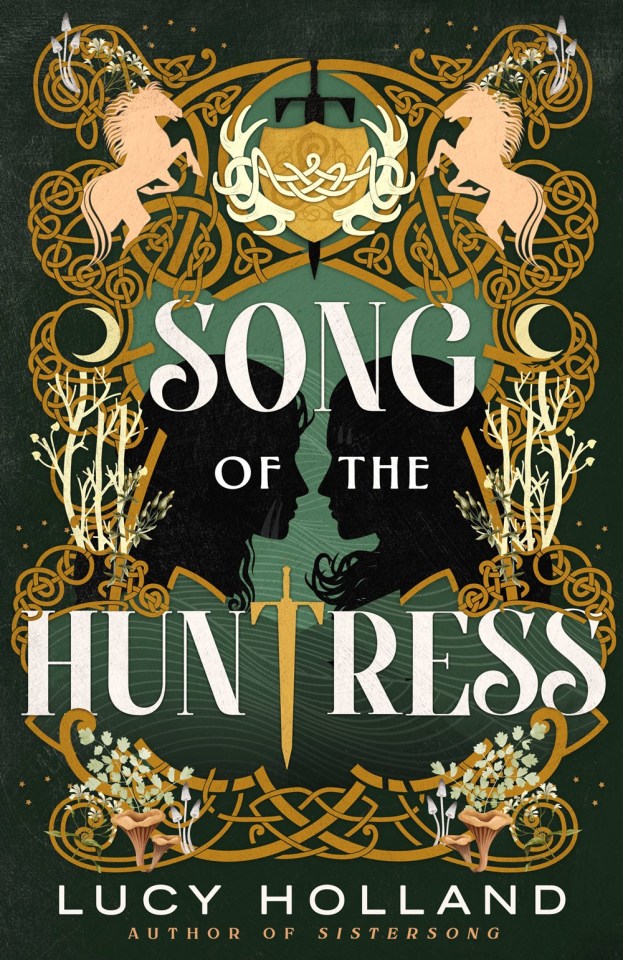
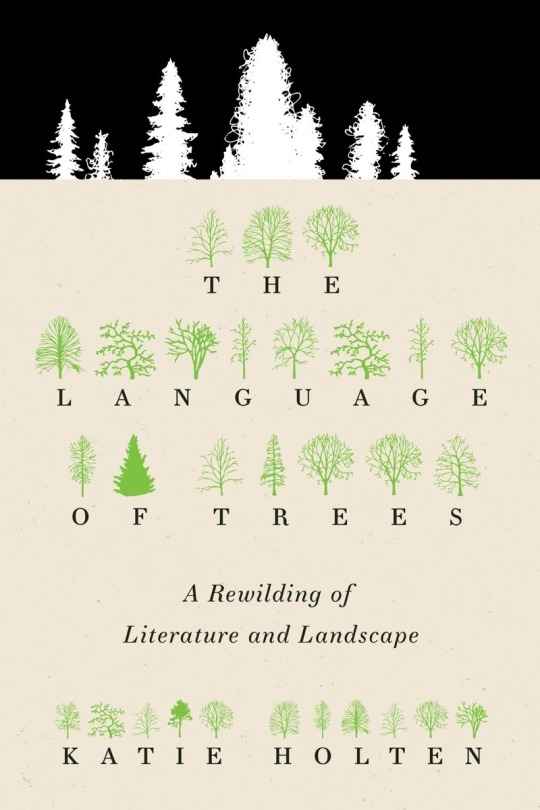
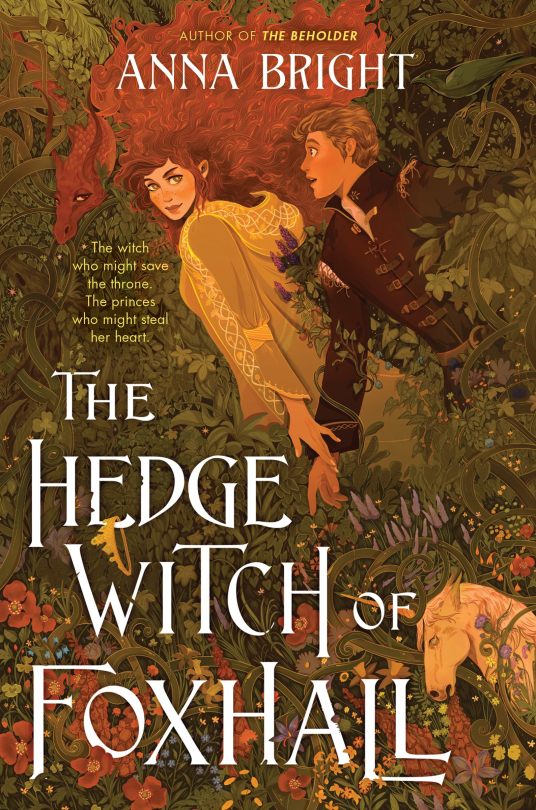
7. Desert Solitaire: A Season in the Wilderness by Edward Abbey. I can see why this is a foundational piece of North American Nature Literature, and I did enjoy my time reading it. Edward Abbey was certainly a man with opinions, and a man of this time. I thought his prose, reflections on the landscape and nature were beautiful and apt. However sometimes he will randomly spout some nonsense. I did really enjoy reading this collection of essays and he makes me want to visit this region, and to really get to know, understand, and appreciate the land. Nature Literature
8.The Witch Collector by Charissa Weaks 3/5 stars. This was my Random TBR Pick for the month of May. I'm not the biggest Fantasy Romance person, but I was willing to give this a try. This was fine. It was entertaining and I kept wanting to turn the page and find out what happens next. I didn't connect with the characters as much as I wanted to, and I did not enjoy the Insta-love that happened. The worldbuildng felt weak, but the magic system interests me. This book definitely steered in a direction I wasn't fully expecting, and I don't think I have any interested in continuing the series. It's not necessarily bad, just not my cup of tea. Adult Fantasy Romance.
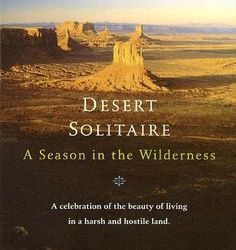
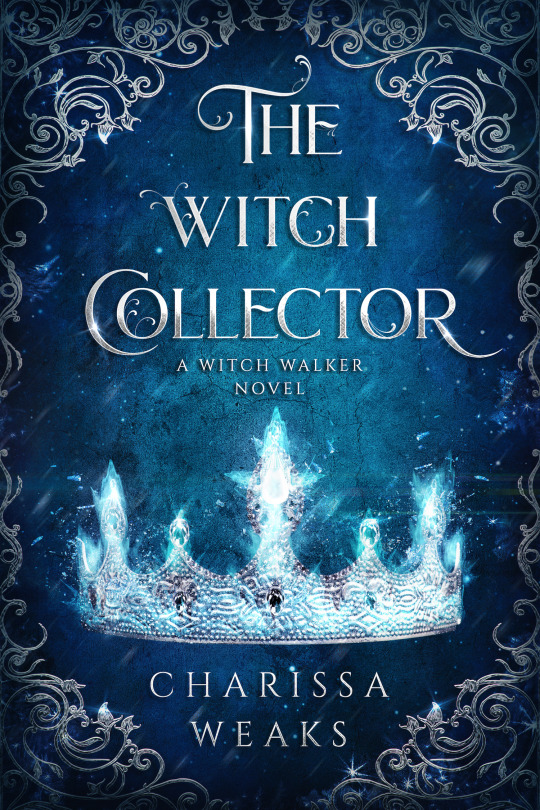
that's all the books I read in May!
My June TBR:
The Magician's Daughter by HG Parry
The Essex Serpent by Sarah Perry
The Blade Itself by Joe Abercrombie
Silver in the Wood by Emily Tesh (TBR pick)
River Horse: A Voyage Across America by William Least Heat-Moon
1177 BC: The Year Civilization Collapsed by Eric H Cline
#books#May 2024 reading wrap up#the familiar#leigh bardugo#the winners#fredrik backman#song of the huntress#lucy holland#the hedgewitch of foxhall#anna bright#the witch collector#charissa weaks#bookblr#fantasy books
18 notes
·
View notes
Text
[book review] Underland: A Deep Time Journey, by Robert Macfarlane
I wasn't quite sure what to expect from this book, going into it. It's a nonfiction book about underworlds, but what did that mean, exactly? What approach was the author going to take?
It turned out that the approach was: Macfarlane, over a number of years, went and visited 10 different places where the human world interacts with the world beneath our feet, and used that to talk about the human relationships with those places, and why we use them and what for, and what the experience is like, and the history of them. Each chapter was on a different place, and was a deep dive into that place in particular, and then the cumulative effect of these different places was built up together to say something bigger.
It's a remarkably beautiful book, caring far more about the artistic qualities of the prose than most non-fiction books I read. It's so evocative and thoughtful at the same time! In each chapter he's so careful about building the narrative landscapes for each chapter, in the details he does or doesn't choose to include. I was surprised to discover in one late chapter that the author must be a birder, because he kept on referring to so many different kinds of birds he saw there, specifically by species name, but it had never come up before because birds weren't thematically relevant details in previous chapters!
The chapters include things like salt mining, cave paintings, tunnels beneath Paris, melt-holes in glaciers, and more. All of it was fascinating and thought-provoking and carefully researched, too.
My one and only point of disjoint in reading the book was in his chapter on nuclear containment, because in my opinion he seems too optimistic about the likelihood of containment methods working for the span of time they'll be needed. Like. Ten thousand years is an astoundingly long time! I have concerns!
But other than that, this is truly an excellent book, and I recommend it highly.
10 notes
·
View notes
Text

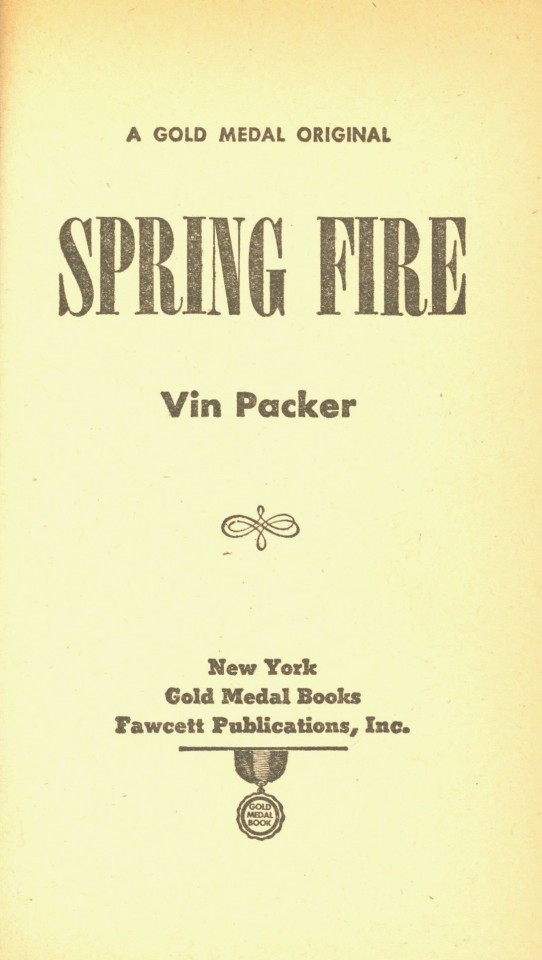

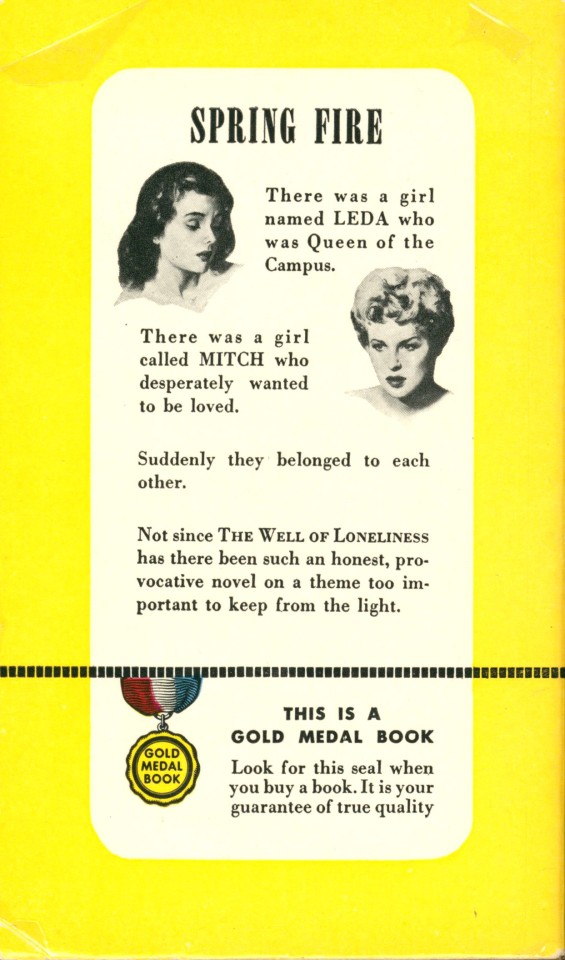
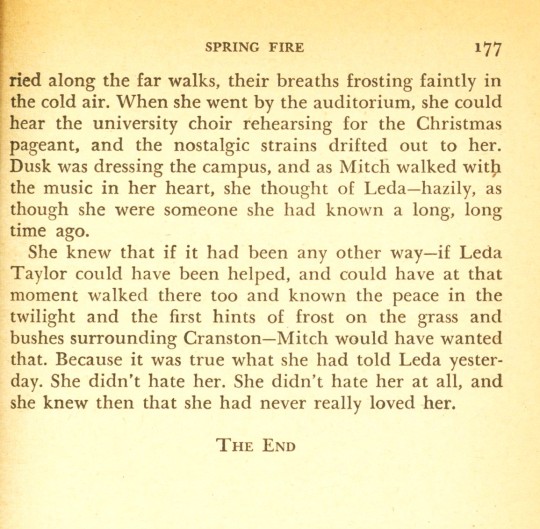
Steamy Saturday
Spring Fire by Vin Packer, the pen name of American writer Marijane Meaker (1927-2022), was the first lesbian paperback novel and was published in New York by Gold Medal Books in 1952. It was an instant bestseller, outselling other popular titles of that year, including James M. Cain's The Postman Always Rings Twice and Daphne du Maurier's My Cousin Rachel, and its publication marks the beginning of the lesbian pulp fiction genre.
The story, based on Meaker's own experience, revolves around the relationship between the shy and awkward, freshman sorority sister Susan ("Mitch") Mitchell and her more experienced roommate Leda Taylor. Both play at heterosexual "normality," while engaging in and at the same time questioning their same-sex attraction. Unfortunately, because it's the early 1950s, the relationship had to end in tragedy, with Leda bound for an insane asylum and Mitch denying to herself that she ever loved Leda.
Meaker was always distressed about having to write that ending. When Cleis Press approached her to republish the novel, she was very reticent. But the project went forward, and according to Wikipedia, Meaker wrote about this in the introduction to that reissue:
"I still cringe when I think about it. I never wanted it republished. It was too embarrassing." Meaker explained in the 2004 foreword that Dick Carroll, her editor at Gold Medal Books, told her that because the book would be sent through the mail, no references to homosexuality as an attractive life could be portrayed or postal inspectors would send it back to the publishing house. He said that one character must acknowledge that she is not a lesbian, and the other she's involved with "must be sick or crazy."
Beside lesbian romances, Marijane Meaker also wrote mystery and crime novels, nonfiction books about lesbians (as Ann Aldrich), children's books (as Mary James), and young adult fiction (as M. E. Kerr), for which she received the 1993 Margaret A. Edwards Award from the American Library Association. The butch/fem cover illustration is by noted American artist and pulp-fiction cover illustrator Barye Phillips.
View more posts on lesbian romance fiction.
View more LGBTQ+ posts.
View other pulp fiction posts.
#Steamy Saturday#pulp fiction#romance fiction#romance novels#lesbians#lesbian romance novels#lesbian pulp fiction#LGBTQ+#Vin Packer#Marijane Meaker#Spring Fire#Gold Medal Books#homosexuality#UWM LGBT Collection
32 notes
·
View notes
Text
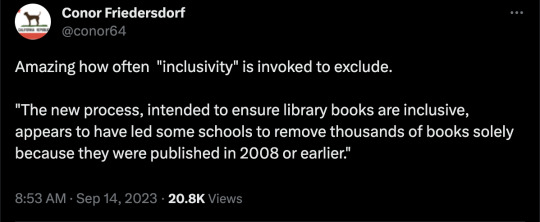
By: Nicole Brockbank, Angelina King
Published: Sep 13, 2023
Harry Potter, The Hunger Games and Roll of Thunder, Hear My Cry.
Those are all examples of books Reina Takata says she can no longer find in her public high school library in Mississauga, Ont., which she visits on her lunch hour most days.
In May, Takata says the shelves at Erindale Secondary School were full of books, but she noticed that they had gradually started to disappear. When she returned to school this fall, things were more stark.
"This year, I came into my school library and there are rows and rows of empty shelves with absolutely no books," said Takata, who started Grade 10 last week.
She estimates more than 50 per cent of her school's library books are gone.
In the spring, Takata says students were told by staff that "if the shelves look emptier right now it's because we have to remove all books [published] prior to 2008."
Takata is one of several Peel District School Board (PDSB) students, parents and community members CBC Toronto spoke to who are concerned about a seemingly inconsistent approach to a new equity-based book weeding process implemented by the board last spring in response to a provincial directive from the Minister of Education.
They say the new process, intended to ensure library books are inclusive, appears to have led some schools to remove thousands of books solely because they were published in 2008 or earlier.
Parents and students are looking for answers as to why this happened, and what the board plans to do moving forward.
Prior to publication, neither Ontario Education Minister Stephen Lecce's office, nor the Education Ministry, would comment on PDSB's implementation of Lecce's directive when contacted by CBC Toronto.
But in a statement Wednesday, the education minister said he has written to the board to immediately end this practice.
"Ontario is committed to ensuring that the addition of new books better reflects the rich diversity of our communities," said Lecce.
"It is offensive, illogical and counterintuitive to remove books from years past that educate students on Canada's history, antisemitism or celebrated literary classics."
Weeding books by publication date raises concerns
The process of weeding books from a library isn't new.
Libraries across the country follow weeding plans to dispose of damaged, mouldy and outdated books and to ensure their collections remain a trusted source of current information.
But Takata, who is of Japanese descent, is concerned weeding by publication date doesn't follow that norm and will erase important history.
"I think that authors who wrote about Japanese internment camps are going to be erased and the entire events that went on historically for Japanese Canadians are going to be removed," she said.
"That worries me a lot."
Libraries not Landfills, a group of parents, retired teachers and community members says it supports standard weeding, but shares Takata's concerns about both fiction and nonfiction books being removed based solely on their publication date.
The group is also concerned about how subjective criteria like inclusivity will be interpreted from school to school in the later stages of the equity-based weeding process.
Tom Ellard, a PDSB parent and the founder of Libraries not Landfills, said teachers reached out to them to help raise awareness about the weeding process.
"Who's the arbiter of what's the right material to go in the library, and who's the arbiter of what's wrong in our libraries? That's unclear," he said. "It's not clear to the teachers who've provided us this material, and it's not clear to me as a parent or as a taxpayer."
Ellard says he's talked to the parent council, his son's principal and his school board trustee. He's also contacted members of the provincial government, but says he hasn't received a substantial response about what happened in the spring and how the process is intended to work.
School board defends process
CBC Toronto requested an interview with the PDSB to discuss how the weeding process works and how the board plans to proceed in the wake of concerns from parents and students. A spokesperson said staff were not available to speak as they were "focusing on students and school families this week."
The board did not address questions about empty shelves, the volume of books removed and reports about weeding books based on the date of publication.
Instead, the board issued statements explaining that the process of weeding books from school libraries was completed in June and has always been a part of teacher librarian responsibilities within PDSB and at school boards across the country.
"Books published prior to 2008 that are damaged, inaccurate, or do not have strong circulation data (are not being checked out by students) are removed," said the board in its statement.
If damaged books have strong circulation the board says they can be replaced regardless of publication date, and older titles can stay in the collection if they are "accurate, serve the curriculum, align with board initiatives and are responsive to student interest and engagement."
"The Peel District School Board works to ensure that the books available in our school libraries are culturally responsive, relevant, inclusive, and reflective of the diversity of our school communities and the broader society," said the board.
Weeding a response to minister's directive
CBC Toronto reviewed a copy of the internal PDSB documents Ellard's group obtained, which includes frequently asked questions and answers provided to school staff by the board, and a more detailed manual for the process titled "Weeding and Audit of Resource in the Library Learning Commons collection."
The documents lay out an "equitable curation cycle" for weeding, which it says was created to support Directive 18 from the Minister of Education based on a 2020 Ministry review and report on widespread issues of systematic discrimination within the PDSB.
Directive 18 instructs the board to complete a diversity audit of schools, which includes libraries.
"The Board shall evaluate books, media and all other resources currently in use for teaching and learning English, History and Social Sciences for the purpose of utilizing resources that are inclusive and culturally responsive, relevant and reflective of students, and the Board's broader school communities," reads the directive.
How weeding works
PDSB's "equitable curation cycle" is described generally in the board document as "a three-step process that holds Peel staff accountable for being critically conscious of how systems operate, so that we can dismantle inequities and foster practices that are culturally responsive and relevant."
First, teacher librarians were instructed to focus on reviewing books that were published 15 or more years ago — so in 2008 or earlier.
Then, librarians were to go through each of those books and consider the widely-used "MUSTIE'' acronym adapted from Canadian School Libraries. The letters stand for the criteria librarians are supposed to consider, and they include:
• Misleading – information may be factually inaccurate or obsolete.
• Unpleasant – refers to the physical condition of the book, may require replacement.
• Superseded – book been overtaken by a new edition or a more current resource.
• Trivial – of no discernible literary or scientific merit; poorly written or presented.
• Irrelevant – doesn't meet the needs and interests of the library's community.
• Elsewhere – the book or the material in it may be better obtained from other sources.
The deadline to complete this step was the end of June, according to the document.
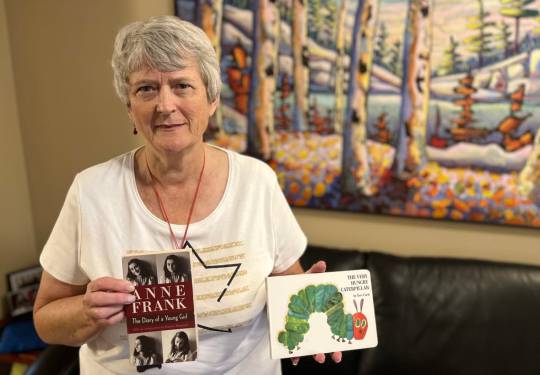
[ Dianne Lawson, a member of Libraries not Landfills, says teachers told her The Diary of a Young Girl by Anne Frank and The Very Hungry Caterpillar by Eric Carle were removed from their school libraries as part of the PDSB weeding process. ]
Step two of curation is an anti-racist and inclusive audit, where quality is defined by "resources that promote anti-racism, cultural responsiveness and inclusivity." And step three is a representation audit of how books and other resources reflect student diversity.
When it comes to disposing of the books that are weeded, the board documents say the resources are "causing harm," either as a health hazard because of the condition of the book or because "they are not inclusive, culturally responsive, relevant or accurate."
For those reasons, the documents say the books cannot be donated, as "they are not suitable for any learners."
A PDSB spokesperson said the board supports its schools "in the disposal of books in a responsible manner by following Peel Region's recycling guidelines." Peel Region allows for the recycling of book paper, as long as hard covers and any other plastics are removed first and put in the garbage.
Books removed based on date, board heard
It was during the first stage of the new equitable curation cycle, that Takata, Libraries not Landfills, and at least one trustee, say some schools were removing books strictly based on publication date.
CBC Toronto recently reviewed a recording of a May 8 board committee meeting focused on the new equitable weeding process. In it, trustee Karla Bailey noted "there are so many empty shelves," when she walks into schools.
"When you talk to the librarian in the library, the books are being weeded by the date, no other criteria," Bailey told the committee.
"That is where many of us have a real issue. None of us have an issue with removing books that are musty, torn, or racist, outdated. But by weeding a book, removing a book from a shelf, based simply on this date is unacceptable. And yes, I witnessed it."
Bernadette Smith, superintendent of innovation and research for PDSB, is heard responding on the recording, saying it was "very disappointing" to hear that, because she said that's not the direction the board is giving in its training for the process.
Dianne Lawson, another member of Libraries not Landfills, told CBC Toronto weeding by publication date in some schools must have occurred in order to explain why a middle school teacher told her The Diary of a Young Girl by Anne Frank was removed from shelves. She also says a kindergarten teacher told her The Very Hungry Caterpillar had been removed as well.
"She has read it to her classes for years, they love it," Lawson said, referring to the Eric Carle picture book.
"I can't find any sedition in it, or any reason why you would pull this book."
Process 'rolled out wrong,' trustee chair says
Trustee and chair of the board, David Green, told CBC Toronto the weeding process itself "rolled out wrong."
That's why he says trustees briefly paused the process until the board could get a better understanding of what was actually going on.
A motion was passed at a May 24 board meeting to ensure that, going forward, those weeding books during the anti-racist and inclusive audit in the second phase of the curation cycle would need to document the title and reason for removal before any books were disposed of.
"We have to make sure that we are meeting the needs of the students and not just rolling something out because we were told to do it," said Green.
When it comes to removing all books published in 2008 or earlier, Green said the board of trustees has heard that, too.
"We have asked the Director [of Education] again to make sure that if that is taking place, then that is stopped, and then the proper process is followed," he said.
Green also said they have plans to communicate with parents about the weeding process.
In the meantime, students like Takata are left with half-empty shelves and questions about why they weren't consulted about their own libraries.
"No one asked for our opinions," she said. "I feel that taking away books without anyone's knowledge is considered censorship."
==
Even given it was "rolled out wrong," it's interesting that some librarians saw no issue with the actions they took.
Which doesn't bode well for the overtly ideological "second phase," in which classic and of-the-time literature is judged through the shallow, postmodern "microaggressions" of present-day activist librarians.
It's always been the people who most want to ban books like "To Kill A Mockingbird" who are the ones who most need to read them.
This is what a purge of history looks like.
#libraries#censorship#literature#microaggressions#history purge#diversity#equity#inclusion#diversity equity and inclusion#antiracism#antiracism as religion#woke#wokeism#cult of woke#wokeness as religion#religion is a mental illness
39 notes
·
View notes
Text
No Woman No Cry by Rita Marley with Hettie Jones
What could a memoir by Rita Marley, widow of Bob Marley, one of the most internationally renowned musicians of all time, possibly have to do with Good Omens? This is what I was wondering when I saw it on the "book club" list in Amazon's X-Ray feature, and what I was determined to find out by requesting it from the library.
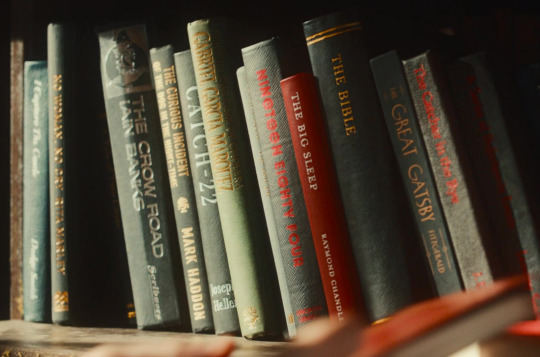
[ID: A screen capture from Good Omens Season 2 Episode 2: several books on Aziraphale's bookshop shelf. From left to right, the legible titles are: I Capture the Castle by Dodie Smith; No Woman, No Cry by Rita Marley; The Crow Road by Iain Banks; The Curious Incident of the Dog in the Night-Time by Mark Haddon; Catch-22 by Joseph Heller; Love in the Time of Cholera by Gabriel García Márquez; Nineteen Eighty-Four by George Orwell; The Big Sleep by Raymond Chandler; The Bible; The Great Gatsby by F. Scott Fitzgerald; The Catcher in the Rye by J.D. Salinger; A Series of Unfortunate Events by Lemony Snicket; Herzog by Saul Bellow. There are a few other books, but their titles can't be seen in the screen capture. At the bottom of the frame are Gabriel's blurred fingers as he removes another book from the shelf. End ID]
Screen capture is from cap-that.com.
As a nonfiction narrative about real people, some of whom are still alive, No Woman No Cry is different from all the other books on the list. It's got intimate details about real people's lives and major historical events, and that is why I'm not going to make one-to-one comparisons to my favorite fictional story.
But I will write a summary and a reflection on it.
Warning for the summary and essay below about racism, colonialism, rape, and spousal abuse. Do feel free to chat or ask me about more specifics, if you're concerned about reading those subjects. Also, though it's a memoir rather than fiction, there are, of course, many spoilers.
So, first of all: I am in so very far over my head when it comes to discussing the deeper themes of this book. I grew up a middle-class white girl in Connecticut, USA in the 1990s and 2000s and experienced neither abuse nor fame in early adulthood; this memoir is written by a woman who grew up a dark-skinned black girl in deep poverty in Jamaica in the middle of the twentieth century, then experienced a dizzying combination of fame and abuse almost all at once. I can empathize with Rita's story as she tells it, but to analyze and extrapolate in any sort of insightful way? No, I don't think I can do that. No Woman No Cry deserves reflection, though. Please kindly bear with a little clumsiness.
I can see from online discussion that a lot of people come out of this book feeling shocked and dismayed to discover that Bob Marley did, indeed, abuse his wife, including an instance she described as "almost rape" when he simply would not accept a sexual rejection. After writing about all this and more, though, Rita Marley continues to miss, love, and admire Bob; per the online comments, many readers seem to have decided that she is misguided, afflicted, or outright delusional for feeling this way. Although I could not forgive Bob's abuses, I also cannot dismiss the positive meanings that Rita has taken from her time with Bob. It's her story, not mine, and she already has her own way of synthesizing the good, the bad, and the ugly.
Summary
No Woman No Cry starts with Rita Marley recalling Bob Marley's death.
But then I started to cry and said, "Bob, please, don't leave me."
And he looked up and said, "Leave you, go where? What are you crying for? Forget crying, Rita. Just keep singing. Sing! Sing!"
So I kept singing, and then I realized, wow, that's exactly what the song was saying: "I will never leave you, wherever you are I will be..."
Rita Marley's full maiden name was Alfarita Constantia Anderson, but she went by Rita her whole life. Her parents separated, as was common, and she lived with her beloved Aunty Viola for much of her youth. Rita was bullied by her classmates for her dark skin; though most Jamaicans are people of color, eurocentric beauty standards brought in by colonialism still led to a strong bias toward lighter skin.
Rita met Bob Marley in Trench Town when they were both getting into music; Rita was in a group called The Soulettes, and Bob was in a group called The Wailers with his friends Peter and Bunny. They bonded over music. They also bonded over Bob's generosity with Aunty and taking care of Rita's child, as Rita was a single mother at the time and Bob was nurturing toward her baby daughter, Sharon. Interestingly, Rita stated she initially got involved in Bob's personal life because she felt she wanted to take care of him, as he didn't have anywhere comfortable to live.
Bob got Rita interested in Rastafari, which connected with her spiritually and helped her gain confidence in her beauty and worth as a black woman. Rita gives Bob a great deal of credit throughout the narrative for helping her discover herself.
Rita and Bob had very little income for the early part of their marriage. They had to stay in a single room at Aunty's house, and although they loved Aunty, it was just too crowded, especially since Aunty and Rita's brother did not approve of all of their decisions. They were judgmental of Rastafari, for example, which had no respect in Jamaica. (Although there is still bias against Rastafarians today, things are a bit better.)
Over the next several years, Rita and Bob moved a few times while continuing to work on Bob's music; they had homes in Nine Mile and then again in Kingston. Rita describes the two of them getting into "love fights" and then making up; they would fight "like children," as she put it, although she was left with physical injuries at times. Aunty warned Rita against staying with a spouse who would hit her. Rita, however, didn't want to leave, partly out of love and partly because she felt that maintaining the marriage was a duty. She also believed she and Bob would always actively choose to be friends, no matter what happened. Bob made up with both Rita and Aunty.
Rita considered different career paths, which included some music, but also the possibility of nursing. On the other hand, Bob devoted himself entirely to music, except for a short time working in the United States. Both Bob and Rita worked in the United States at different times. Neither of them liked it. During Rita's stay in the US, she hated being away from home and felt like she was growing apart from Bob. When Rita got back to Jamaica, she discovered that two other women were pregnant with Bob's children. Though she was angry, Rita decided that because of her spirituality and her continued love, she would remain married to Bob, but would focus on taking care of herself and the children. By now, the family had three children: Shannon (who Rita had before meeting Bob and who Bob formally adopted), Cedella, and David Nesta (better known as Ziggy).
This whole time, Bob had been working on music, with Rita helping when she wasn't away in the US. They had been establishing relationships with studios and selling records, and were seeing some success.
Bob and the Wailers' new producer gave them a house as a space to work and make music. That house was at 56 Hope Road in Kingston, and it's still a famous site today. By the time they got that house, Bob was entirely the one performing with the Wailers, while Rita was mostly taking care of the children. Because of the constant activity from strangers, business dealings, and womanizing that went on at Hope Road, Rita did not want to raise her children there, and she decided to get a government-sponsored house in Bull Bay, another city.
Bob ultimately bought the house in Bull Bay at Rita's request. Rita worked hard on developing her independence while she was raising the children there; she learned to drive and garden, and the garden yielded many fruits and vegetables. Aunty and other friends helped out, too.
Bob financially supported Rita and the children. He divided his time between the house in Bull Bay, the house at 56 Hope Road in Kingston, and tours. Rita and Bob's relationship seemed to be somewhat fluid here; on one hand, Rita describes herself as a "friend" or "sister," and she strongly contemplated divorce. But she also describes how she got a basement studio at the Bull Bay home, and how she and Bob would go down there to make out sometimes, or, more often, to make music. Sometimes, they'd even have little family "events" in that basement studio wherein the children, who were now a bit older and had strong interests in music themselves, could put on imaginary little shows for fun.
Although Bob constantly had girlfriends, he got inordinately jealous of Rita's friend and neighbor, Owen Stewart, known as Tacky. Tacky was not initially a romantic interest. However, Bob assumed he was. One night, Rita informed Bob that she didn't want to have sex anymore because of his constant philandering; she wanted to take a stand. But he was absolutely insistent, arguing that he should be able to have sex with her because she was his wife, until she finally went along with him. Rita comments, "I was almost raped that night."
It sounds like it was rape to me. And Rita got pregnant from it. She and Bob now had another son, Stephen.
Rita and Tacky had by then started having a sexual relationship, which Bob tried to confront Tacky about. One of Bob's girlfriends just happened to appear right while he was talking to Tacky, which was a massive embarrassment and which Tacky correctly used to point out Bob's hypocrisy. Bob stopped arguing, and Rita continued her relationship with Tacky. Rita also had a child with Tacky, a daughter named Stephanie, who Bob adopted.
Life, incredibly, moved on, and Rita suggested to Bob that she should start a juice bar with some of her produce at his Hope Road studio location. Bob agreed, and Rita started the stand that eventually became the Queen of Sheba restaurant. Everyone loved her organic food; Rita comments that Bob was her best customer and PR man.
While running the Queen of Sheba restaurant, Rita reconnected with some friends: Minnie, Judy, and Marcia. Minnie helped a great deal with the restaurant. Rita, Minnie, and Judy wanted to start a Rastafarian women's organization and school for Rastafarian children, while Rita, Judy, and Marcia agreed to sing together at a club. It was Rita's first public performance in a long time.
Right after this, The Wailers broke up. Specifically, Bob signed on again with the same record label and would still work with new singers as "Bob Marley and the Wailers," but the other Wailers, Peter and Bunny, left. They weren't happy with the way the label was headlining Bob. Bob felt deeply hurt by the group's dissolution, but he asked Rita, Marcia, and Judy to come sing backup with him in the studio and on tour.
Bob was paying Rita, as well as Marcia and Judy. But at the same time, Rita got to make music with Bob again, and she loved that. She was very happy to go on tour with him, partly out of a desire to spend time together again - through all the horrible things that had happened, they still loved each other and wanted to spend time together. Rita was also happy to be working on her own musical career. Rita, Marcia, and Judy had named their trio the I-Three, and this would be solid work for all of them.
Rita insisted on getting to be her own separate person on tour, a member of the I-Three instead of Mrs. Marley. She writes about wanting to continue looking after Bob on the road - ensuring his laundry was done and meals were eaten, for example. But otherwise, she stated, she was free to do whatever she wanted on the road in a way she couldn't be at home and wouldn't have been if she were expected to be acting as Mrs. Marley the whole entire time. She also, however, writes about missing her children and her home dearly.
Again, Bob and Rita's relationship continued to seem very fluid. Bob would get jealous if he thought other men were involved with Rita; there was even an incident when he came into her hotel room, started shouting when he saw a male friend in there, lifted Rita up off the bed, and dropped her back on the bed. But he also continued to have affairs and children with other women. Rita writes that she wasn't threatened by many of these women because there were so many of them and they didn't represent serious relationships. Rita also felt it was easier to just take Bob's children by other women into her home, and she often had friendships with their mothers. There were a few women who seemed serious enough for Rita to be hurt by their presence, but over and over again, she chose not to worry about it, because she viewed her role as more important.
Despite the difficulties of dealing with Bob's womanizing and being away from home, Rita chose to stay on tour for all those years because she was instrumental in holding together "such a good thing" - Bob's musical tours with the I-Three - and she sensed it was important to people all over the world. She also loved the sense of individual development she got from that time. Rita comments:
Take your troubles to the Lord and not to the people, I'd tell myself. So I did just that---I prayed. And I gave my part, I gave it honestly. I gave my part, from the heart, and I was paid for it. Paid every week, just like everybody else. So I could maintain myself, not just physically, but with a lot of spirit. And on good days, even though I wasn't altogether happy, I felt so independent, thinking, well, now I can do whatever I want, now I can buy clothes and shoes that I like, I can be---whew---just what I wanna be!
During the seven years they were touring (interspersed with time at home in Jamaica), Bob and Rita did have their arguments and fights, but they overall got along well and were still in love, so they solidified their relationship "as man and wife" again.
However, Rita still didn't feel individuated in the way she wanted to, so she signed with a record company named Hansa Music. Bob did not like this because he wanted to be the one to give Rita her big break; he wanted to keep the music in the family. He felt like white people (Hansa Music was a French company) were taking Rita away. But Rita and the record company were persistent, and he finally agreed to cooperate. Rita started working on her own individual music.
Bob had a political presence - people had come to think of him as "the voice of the people," and youth from the ghetto tended to look to him for help. People would come to Hope Road looking for favors and financial help, with which Bob was generous. But a lot of the people looking for help were mixed up with crime. He became anxious, even paranoid, as people sought help with matters that could endanger Bob and the family - people asking to stay at Hope Road to avoid gang violence, for example.
Eventually, the government asked Bob to do a peace concert called "Smile Jamaica" to encourage peace in the population before an election. Bob agreed, because he believed in peace.
Just after a rehearsal shortly before the concert, Bob and Rita were shot in an assassination attempt; Rita was shot in the head but the bullet didn't cause a fatal wound because of her thick dreadlocks, and Bob was grazed across the chest and shot in the elbow, where the bullet remained for the rest of his life.
Bob insisted on doing the concert anyway, with the bullet in his arm. Rita was up there with him, even though they hadn't been able to remove the bullet from her head yet, either.
After the assassination attempt, the shaken family spent some time in the Bahamas, in Nassau. Bob then went "into exile" in England, where he reconnected with one of his girlfriends. Rita and the children went back to Jamaica for school, but no longer felt safe in their Bull Bay home, so Bob bought a three-sister (three-family) house for them in Kingston. Rita and Bob continued to talk almost every day by telephone.
The political situation didn't lighten up - Bob's influence was being tracked in the United States, and this included intelligence agencies monitoring his mail - but he decided to return to Jamaica after about half a year because he missed his home. However, Bob returned to increased political activity, including more people asking for dangerous favors; again, gang members asked to stay in his home and wanted to act as his personal security.
Before what would be their last tour, Rita wanted to get a different house for the children. She and Bob disagreed on the house; Rita wanted a smaller but beautiful house on a hill overlooking Kingston, while Bob had plans to build a mansion he could settle into with all of his children and work on his music. Rita realized Bob was planning much more for himself and the children than for her, even though he also made a bunch of promises about being a better father, friend, and husband after this tour. He was planning to settle down. Rita told him that was nice, but still decided to put her advance from the tour toward the house on the hill.
During this next tour, Bob injured one of his big toes twice, first in 1975 - after which point it never fully healed because Bob would not give it a rest - and then again in 1977, after which the nail fell out and he developed malignant melanoma. He was advised to have the toe amputated. However, he refused, believing he couldn't perform without his big toe, that audiences wouldn't want to see that, and he was told the doctors were lying. He believed the doctors were lying.
They proceeded with the tour. Bob was extremely famous at this point, and Rita felt she was losing him; other people controlled all his time and influenced his every decision, and Bob felt obligated to keep up with all the demands, even at the expense of his own health. Eventually, Bob collapsed and was taken to the hospital, at which point he discovered his cancer had spread to his brain and he had only months to live. Because the diagnosis was terminal, Bob's managers were planning to keep him touring until he died, but Rita was outraged about this and called everyone she knew to insist on bringing the tour to a stop.
Bob did get cancer treatment, first in the US and then with a specialist in Germany. The German doctor, Dr. Josef Issels, managed to keep Bob alive six months longer than the other doctors believed was possible; however, he soon died very young, at the age of 36.
Rita was devastated. As they were both young, Bob's death was the first major loss Rita had experienced.
Moreover, Rita was immediately thrown into managing a ton of issues that had never been planned for. Rita was betrayed and taken advantage of by people who had been involved in managing Bob's finances, and she even ended up on trial because they accused her of misusing Bob's money after his death. However, everything Rita had used the estate's money for was legitimate. She acted according to the financial advice of his manager, and took care of the children, and paid for his funeral, and paid legal fees. Bob also simply was not as wealthy as people believed; his legacy has generated a lot of money over decades, indeed, but at the time of his death, he wasn't inordinately wealthy, or he wouldn't have felt so much pressure to do all that touring.
Summing up their relationship after Bob's death, Rita writes:
I thought Bob did the greatest thing by leading me to find myself.
... 'You are what you are, you are black and you are beautiful.' And I know there are many, many others who learned that same lesson from him.
Rita went on to carry Bob's legacy forward, keeping his music alive. In 2000, Time magazine awarded the "Song of the Century" title to Bob's song "One Love" and the "Album of the Century" title to Bob's album "Exodus." Bob's children now have musical careers, which Rita has nurtured.
Rita was able to set Aunty up, eventually, with everything she wanted, and Rita's father came home to spend time with his many grandchildren. Eventually they both passed away, and as keenly as she felt the losses, Rita was able to lean on her friends. Rita also had one more daughter named Serita with Tacky.
Over the past few decades, Rita has continued to pursue her dreams and live an incredibly active life. She has continued to promote Bob's music, but also moved to Ghana and started a nonprofit called The Rita Marley Foundation, caring for infants and the elderly. She has done a great deal of humanitarian work.
Worth noting that Rita structured this book so it ended with the same idea with which it started:
So I started to sing, as he told me to do, and just as he said it would be, everything was all right. Rastafari!
The Big Picture
The way I see it, a big part of No Woman No Cry is about identity and individual will. The concept of identity is in the ways we're defined by our connections, from intimate connections to large-scale social contexts, and in the ways we're defined by our own choices. It hit me with almost every chapter how strong Rita's individual will was while at the same time being interconnected and interdependent with so many other people in her life, and, of course, being shaped by her race and Jamaica's status as a colonized nation until 1962.
This book is also a study in the complexity of human connections - particularly, in how it is possible to meld hopes and dreams with another person's, and to unreservedly lean on other people, without losing one's sense of self. Rita and Bob chose to marry because they had mutual dreams; Rita chose to stay with Bob, though, because of the way she personally wanted to live. And she simultaneously pushed for her independence, which in the end was the thing that allowed her to do so much of her own humanitarian work and carry on Bob's legacy, too.
This pattern, wherein individual will and relationship connections mutually strengthened each other, carried out with all of Rita's close friends and loved ones. I'm thinking especially of Aunty - Rita and Aunty clashed a great deal in Rita's youth, and yet, each valued their family connection as much as their own individual will. They stuck together despite the friction; Aunty helped raise the children, and later, Rita was able to provide Aunty with a comfortable life. That in turn was possible only because of Rita's insistence on making her own choices while Aunty insisted on continuing to provide support.
Hand-in-hand with the concept of identity is memory. This is, after all, a memoir. Its very purpose is to solidify memories, to put them in the form of a book and to help other people understand Rita's life with Bob. When Rita explains her motivations in writing, she's giving her individual will, her choices, a material presence in the world. Although I don't believe Rita comments on this in the book, I'm imagining that the act of putting her memoir in writing helps solidify her power over the narrative of her life; by writing out our stories and the thoughts that inform them, we can illuminate the power our own choices have.
Another theme running strong throughout No Woman No Cry is faith. In high contrast to the themes of The Crow Road, Rita Marley's faith doesn't hold her back; it gives her strength and connects her to others. "Faith" for Rita means Rastafari. It helped her connect with her inherent worth as a black woman, and it helped her see her own success as part of a better world overall. Rita shores up her faith against the oppressive, authoritarian nature of colonialism. For Rita, faith isn't something that subdues her with dreams of another world; it's something that moves her to act in this one.
The book opens and closes with assurances that Rita should just keep moving forward (singing, in her case) and everything will be all right. That's also faith - the belief that she will succeed if she just presses forward, even if she's not sure how that can happen. Her spirituality allows her to tap into this, but it isn't specific to a particular belief system. It's just about being willing to believe, time and time again, that one foot in front of the other will ultimately lead somewhere good.
Altogether, I believe No Woman No Cry was on the Good Omens book club list because No Woman No Cry centers the depth of the human experience: the things that make us who we are, the ways we connect with other people, and how we can figure out where we belong.
7 notes
·
View notes
Text
2023 in Books
I need to stop bragging that I’ve got this reading thing all figured out, because man if 2023 wasn’t a year of terrible books. I liked less than half of the 37 I read and nothing quite gripped me in the way it has in years past… but to put it more optimistically I liked a full third of what I read, and the ones I liked best were a fascinating and unexpected silver lining. Without further ado:
Cyrano de Bergerac by Edmond Rostand, trans. Brian Hooker
Tell this all to the world- and then to me. Say very softly that… she loves you not.
I read a couple of plays this year for the first time since college and liked them fine, but there’s a reason this has been adapted five million times. Everyone go watch Megamind right now.
Wylding Hall by Elizabeth Hand
Of all the found footage-inspired horror fiction I’ve read this one makes the best case for existing in its chosen medium, as a 70s UK folk rock band are interviewed about the summer they spent recording what would become their final album [thunder crashes.] It reminded me of a Tana French mystery in its language and ability to make space feel lived-in; the character writing is so strong I realized that at some point I had stopped checking the interview headings to know who was speaking. Hand unfortunately distrusts her audience to read between the lines at a few crucial moments (and ruins what would have been a perfect ending and a deeply affecting scare by gilding the lily, or, in this case, photograph), but I love that she went from seemingly by-the-numbers American YA fiction to a meticulously-researched and truly unique horror novella. Puts other writers working in the genre to shame.
A Kiss Before Dying by Ira Levin
Reminiscent of the best kind of TCM suspense thriller (and was adapted into one), but could only exist as a book for the kind of narrative tactics it employs. Levin is brilliant at setting and character; I think any one of his contemporaries would have leaned into archetypes for this sort of story, and he instead distinguishes his proper nouns in subtle, clever ways that lend them the weight a noir needs. Can’t wait to read more of his stuff!
All the Names They Used for God by Anjali Sachdeva
I’d like to know why this anthology got hit with what a friend has termed a pottery barn throw pillow cover + a ‘the tiny things we know to be small’ title, because the eponymous story isn’t even called that! It’s just The Names They Used for God, and is, appropriately, about two women kidnapped by a religious extremist group. High risk-high reward; I think taken at their base premise the stories could have been insufferable and are instead strange, compelling, and fantastical. There’s a methodicalness and, I don't know, lack of whimsy? to them that’s unusual for fantasy, but also an absence of any one goal or moral in the way Le Guin speaks so highly of. It made me feel the way I did reading and adoring Kelly Link in middle school, and Sachdeva has a much different style that I guess works all the better on adults. My favorite was Robert Greenman and the Mermaid.
Seabiscuit: An American Legend by Lauren Hillenbrand
Someone recommended this to me via Tumblr anon over five years ago, so let me start by saying if that was you I’d like to thank you properly! This book rules! It was written in ‘99 so falls prey to a very specific kind of jingoism, but the mechanics of that are interesting in and of themself. Seabiscuit the animal is a lens through which to view turn-of-the-20th-century America written from the precipice of the 21st; his story told through the expertly-researched biographies of his owner, trainer, and jockey. Hillenbrand is not only a good pop nonfiction historian, but has been a sports writer since the 80s and I never imagined the genre could be so thrilling as I did reading her work. Horse racing is insane and no one should be riding these things btw.
The Age of Innocence by Edith Wharton
It was one of the great livery-stableman’s most masterly intuitions to have discovered that Americans want to get away from amusement even more quickly than they want to get to it.
Wharton came from old money New York*, was deeply disillusioned with it and pined for rational (i.e., even more insane) social and political scenes, had myriad thoughts about women and gender relations, and held a love for interior design. I learned all of this after reading but it’s apparent on every page; deeply funny and perceptive, fantastic use of language, the moments where it lost me completely nothing if not interesting. What sticks with me the most are a flair for the operatic and an ability to voice both the feeling and consequences of losing oneself to imagined scenarios. Read the pink parasol scene.
*Ancient Money New York; the saying ‘keeping up with the Joneses’ is apocryphally attributed to her father’s side of the family
Owls of the Eastern Ice: A Quest to Find and Save the World's Largest Owl by Jonathan S. Slaght
We’d return to our camp to huddle in the freezing tent and wait for our owls in silence, like suitors agonizing over a phone that never rings.
One of the better pieces of science writing I’ve read in a long time, as Slaght frames rural communities as a quintessential part of ecology rather than a barrier to it. His style is amiable and matter-of-fact (sometimes overly so; the amount of metric GIS directions, help), but he's super engaging and clearly holds just as much compassion for people and history as he does animals and natural landscapes. The Blakiston’s fish owls he’s studying are described as unreal, with hoots so low and quiet it sounds like someone has thrown them under a blanket. You can listen to them here.
Piranesi by Susanna Clarke
Took my breath away and surprised me in a way a book hasn’t in years. I'd read Clarke’s 2004 novel when I was maybe fourteen and had vaguely positive but mostly neutral memories of it, and Piranesi being sci-fi-fantasy that came recommended by Tiktok had me very dubious. I ended up devouring it in the way I haven’t read books since I was fourteen; more of a mystery than the suspected high fantasy, with characters I would do disservice to in trying to describe in brief. While the mystery isn’t difficult to ‘solve’ (I’d argue the book also skews young!), the story ends in a way that’s both deeply unexpected and in the only way it could have.
Honorable mentions
The Count of Monte Cristo by Alexandre Dumas, trans. Peter Washington
[Jigsaw voice] Every man has a devouring passion in his heart as every fruit has its worm.
I spent so much time running my mouth about this one on Tumblr there’s really not much left to say. I think it’s a work of genius that was physically exhausting to read, and I’m sticking it with the honorable mentions mostly because I remember The Three Musketeers being the better book. If you want to read Dumas- and you should- start with that one.
Jonny Appleseed by Joshua Whitehead
I would’ve liked this more had I read it in my late teens/early 20s, but I still think it’s pretty good and would absolutely recommend to anyone in that age bracket. Things that normally annoy me about philosophical first-person lit fic didn’t matter under the weight of Jon’s narratorial voice. He reminded me a little of Lynda Barry’s Maybonne in his understanding and depictions of community and family; his stream of consciousness letting contradictions sit rather than trying to explain them away (Whitehead also makes sex very prosaic and pretty-sounding while still being frank and gross about it, which is a rare talent!)
The Seeds of Life: From Aristotle to da Vinci, from Sharks' Teeth to Frogs' Pants, the Long and Strange Quest to Discover Where Babies Come From by Edward Dolnik
This one fell in the rankings because the writing isn’t my favorite (think early days Vulture article rather than NYT), but I cannot stop referencing it in conversation. I want to read the whole thing to people and make them understand how truly unfathomable it is not only that every one of us is the product of 1 sperm and 1 egg, but that anyone ever figured out how that process works. When Western Europeans first started using microscopes they studied water; there were gross little bugs in there to watch and enjoy, so when semen was revealed to have its own bugs no one was shocked, but they also weren’t impressed. We would not see one enter an egg until EIGHTEEN SEVENTY-FIVE.
Killer Dolphin by Ngaio Marsh
The Malaise of First Night Nerves had gripped Peregrine, not tragically and aesthetically by the throat but, as is its habit, shamefully in the guts.
Has made it into my top 5 favorite Inspector Alleyn mysteries. I’m not keen on Marsh’s theater settings (and there are a LOT of them), but a convoluted setup made this one all the more rewarding. The final revelation as to a point of blackmail is visceral and bizarre in a way I haven’t seen from her before.
The Wretched of the Earth by Frantz Fanon
We all have dirty hands; we are all soiling them in the swamps of our country and in the terrifying emptiness of our brains. Every onlooker is either a coward or a traitor.
Best read in conversation with other writers, I wouldn’t recommend Fanon as the end-all-be-all introduction to communist and socialist thinking (the fact that he inadvertently describes what was going wrong with the USSR at time of writing is fascinating), but he explicitly invites that conversation and the value and impact of his work really can’t be overstated. Our points of disagreement tend to be in regard to nationalism, not his condonation of violence.
Persuasion by Jane Austen
Fascinating to see how Austen was thinking about relationships near the end of her short life. I laughed to see the idea of preferring your brother-in-law’s family to your own was back in full force from my own favorite Emma, as well as an eleventh-hour ‘maybe I should ship the villains??’ My biggest issue is that, like Emma, Persuasion is written in third person limited narration, but Anne is fundamentally Good™ so doesn’t need to learn anything about herself or the world; critic Bob Irvine points out that she and her dashing, misogynistic sailor are beset rather than changed by it. That said I love a people being beset by people (concussed temptresses) places (Bath) and things (cars), and Austen's writing style is really firing on all cylinders here.
#i say 'nothing quite gripped me' but i'm still pretty fresh off some of these so remains to be seen in the long run!#(e.g i always end up wanting to swap at least one finalist and one honorable mention looking back at last year's list)#also as always these aren't ranked- just loosely grouped by date read#books#2023
14 notes
·
View notes
Text
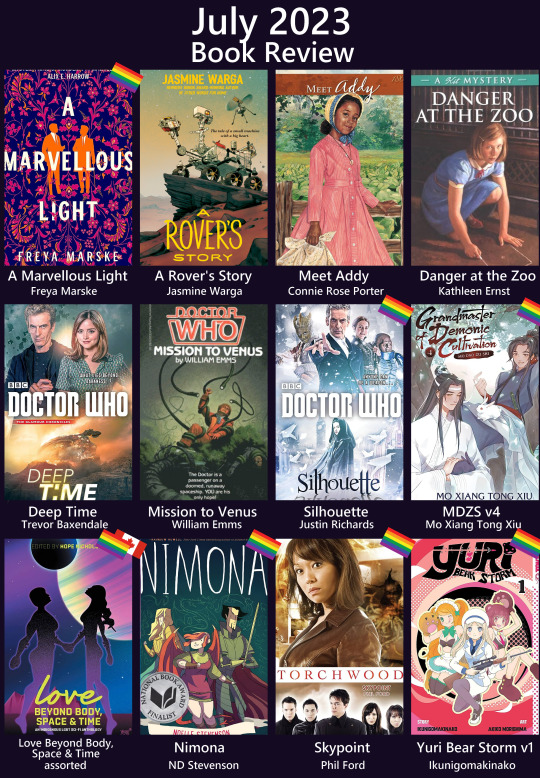
I had an impulsive July! Some of these books are continuations that I more or less expected to read, but I sure did just grab some random books this month. Most of which pleasantly surprised me! A couple of which just simply surprised me...
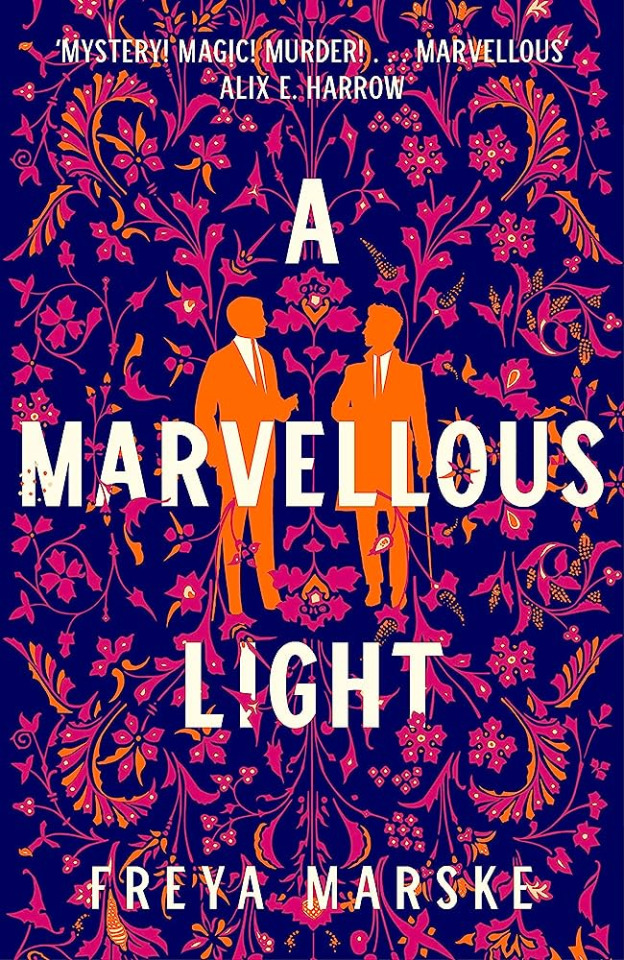
A Marvellous Light
A Marvellous Light was probably my favourite book this month and it was one of my random impulses! I saw some fanart that intrigued me so I grabbed it from the library on a whim -- by now I have bought my own copy because it was just that well done. I am always a sucker for a well executed period adventure, especially when it can work in magical elements (I’m looking at you Gentleman’s Guide to Vice and Virtue) and this did everything I could possibly want from this sort of novel. It’s set in the Edwardian period and was such a perfect blend between action, tension and mystery, comedy, and romance; I was completely invested in both of the main characters the whole way through. Oh, and it felt like it fit in the time period, that the dialogue, narration, manners, stage dressing were all appropriate. There's nothing worse than a historical novel where the writing feels painfully modern.
The story starts out with baronet Robin Blythe who is having a no-good very bad day at work. He holds a civil servant position in the government and was just demoted to a shoddy little nothing position that he’s never even heard of by someone with a grudge against his parents. He quickly realizes how in over his head he is though when he finds out that the “special” part of “Special Liaison” actually means “magic”. Something that definitely doesn’t exist, except apparently it does, and now he has to navigate this strange new world with a very exasperated magical coworker, Edwin Courcey. His day only gets worse from there...

A Rover’s Story
A charming little novel told from the point of view of a fictionalized Mars rover. I admit I’m not a very science minded person, but from my inexpert opinion it seems quite well researched, with their Rover being heavily modelled after the previous rovers that were sent to Mars. I appreciated the author's note at the back that discussed some of the research that went into the novel, what was and wasn't accurate, and what was changed for the sake of narration.
It is a very neat journey that starts with Resilience still in pieces in a lab, as it gets to know the scientists around itself and what its eventual mission will be, and how its life goes from there. Though it can't communicate with the humans, it is able to communicate with all sorts of other electronics in the lab! The story is counterbalanced by the daughter of one of the scientists who writes to the rover as a sort of journal to deal with her mother so rarely being home. It was a quick read but very sweet.
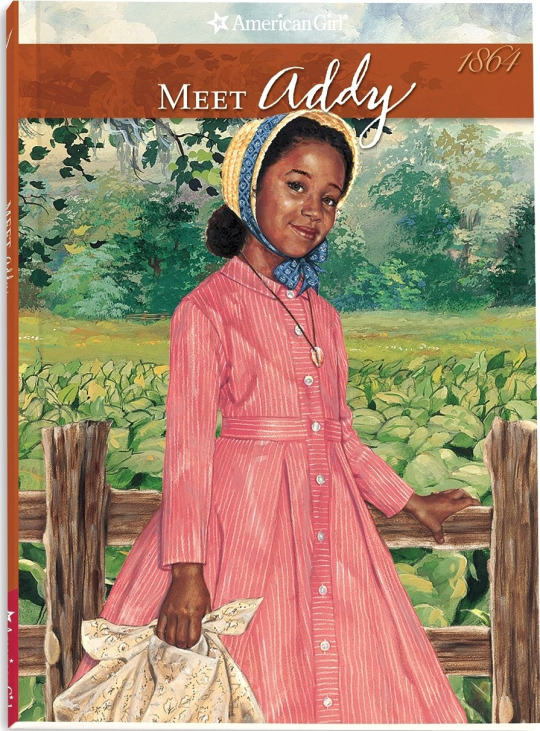
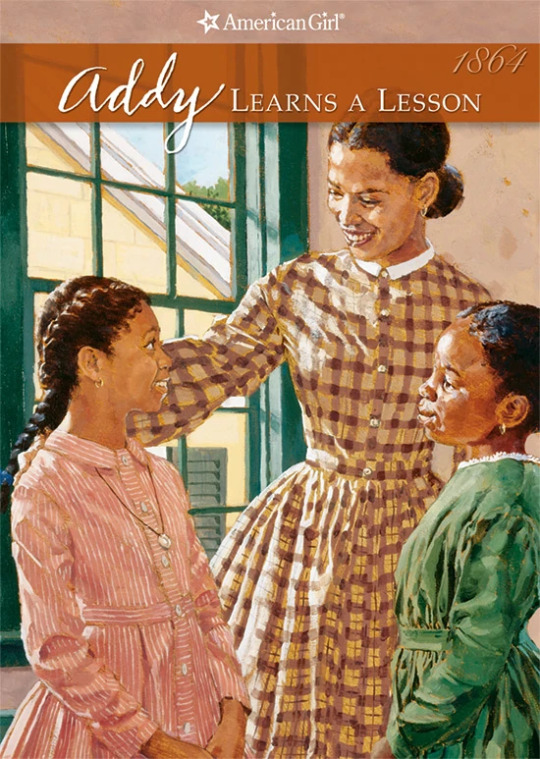

American Girl: Meet Addy // Addy Learns A Lesson // Danger at the Zoo
I have continued to read the American Girl books after being pleasantly surprised by the Kit book I read last month (Kit Saves The Day). Their strongest point is definitely what strong historical fiction stories they are! At least from the ones I’ve read so far, the time period is never just a backdrop, the authors do take the time to ensure that the novel’s plot and problems are directly tied into what makes that point in time unique, and even as an adult I found myself learning interesting tidbits of information. The little “looking back” nonfiction section at the end of the books is especially neat!
I really enjoyed both of the Addy books I read. These stories take place in 1864 during the Civil War. Addy’s family are slaves on a southern plantation, and the first book is about Addy’s escape from captivity with her mother, while the second book looks at the continued hardships and inequality that even free black people in the North suffered. They did a good job balancing the intended age bracket with the seriousness of the subject matter, and it didn’t feel like it shied away from making its point.
The Kit Mystery book, Danger at the Zoo I was less impressed with, which disappointed me because I really enjoyed Kit Saves The Day. It wasn’t bad, per se, just rather middling. A fine read, but not dazzling. Maybe I had overinflated my expectations; given that it was a bigger book, I had hoped that it would up its game a bit, but it felt rather the opposite. It was a fine story, it dealt with historical details well, but it did a poor job creating the sort of tension I would want from a proper “mystery” novel. It often felt like we were treading water, where a quicker pace would have helped.
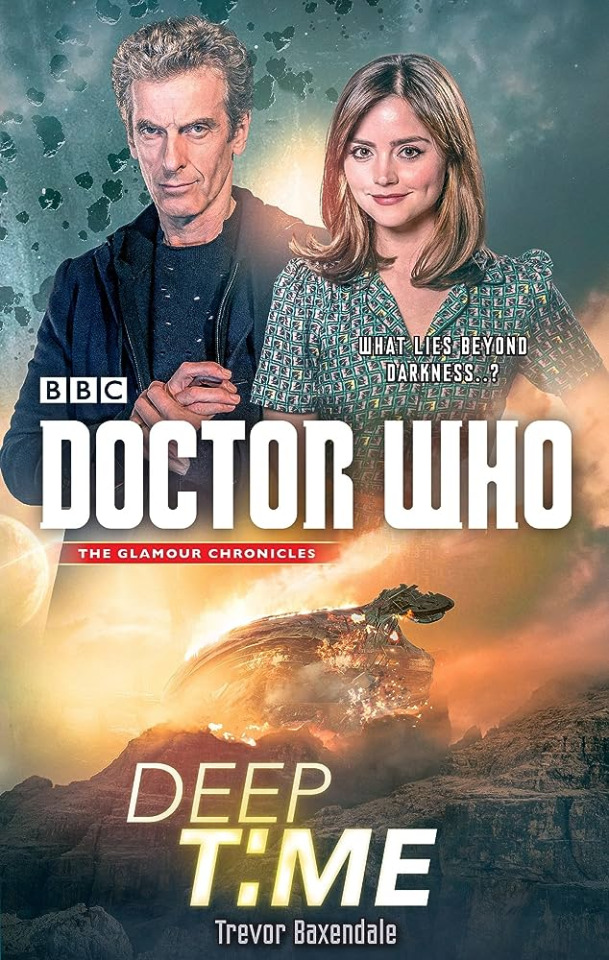


Doctor Who: Deep Time // Silhouette // Mission to Venus
My Doctor Who kick is still going strong. Relentless. Silhouette and Deep Time were both fine, basic examples of a decently written Doctor Who novel. Deep Time was rather forgettable... the side characters never really succeeded in interesting me, and it often felt like it suffered from pacing issues. It was about the Doctor and Clara on a doomed space mission that gets stranded in deep space, but I enjoyed listening to it in the background while I was doing other stuff.
Silhouette was actually pretty great, probably because I’m a total sucker for the Paternoster Gang. It was a fun mystery set in a ~mysterious carnival~ during a frost fair on the Thames. It had the characters splitting up and exploring different avenues to solve a set of murders. Lots of good Vastra and Jenny stuff, and Strax was absolutely hilarious, he stole the show every time he was featured. Love him. The whole thing was a pretty solid plot, pretty funny, and I thought both The Doctor and Clara got pretty decent characterization throughout. Would recommend this one if you want a solid Doctor Who read.
The last one, Mission to Venus, was hands down the funniest though, albeit unintentionally. Did you know there were really trashy Doctor Who Choose Your Own Adventure books written in the 80s? I didn’t, but I do now and obviously I had to get my hands on one. It is Exceptionally Bad but in the funniest possible way. I had a blast reading through this and I really don’t know what to say about it besides look at the cover. Look at it. Amazing. The Doctor, Peri (and You!) wind up on a spaceship that is trying to transfer dangerous by highly nutritional plants to a stricken colony, but is very soon imperiled.
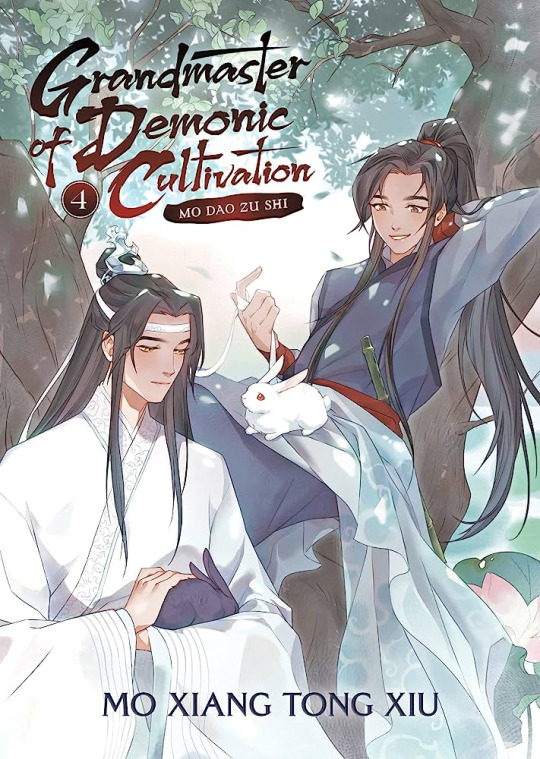
Grandmaster of Demonic Cultivation v4
I creep every closer to finishing the Grandmaster of Demonic Cultivation series! Not much I can say about it that I haven’t said about the others that wouldn’t enter outright spoiler territory, so I’ll just say that this was another great volume. Some of them have felt overly bogged down by some of their flashbacks (like the entire back half of volume 2 and the endless Yi City arc. I'm not saying it wasn't interesting but my god this was a Victor Hugo level diversion) but this one went at a great pace and it’s nice to feel like we’re actually making progress in the main plot even if, romantically speaking, WWX and LWJ continue to be two of the dumbest human beings alive. Bless this slow burn, I’m gonna kill them both. Also enjoyed the side characters we got in this book — I loved how great the Juniors were, loved my dear, cranky, miserable Jiang Cheng, loved Wen Ning Doing His Best. Great book. I’m dragging my feet about reading the fifth book because I don’t want this to end.
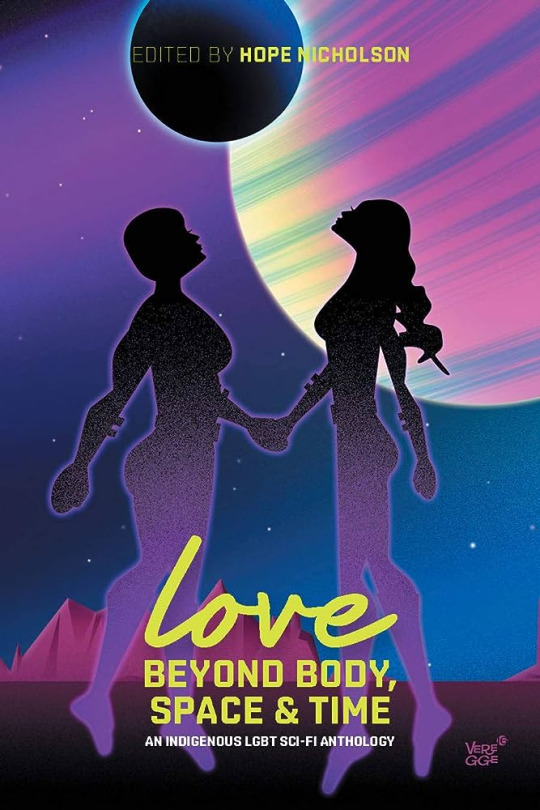
Love Beyond Body Space & Time: An Indigenous LGBT Sci-Fi Anthology
A really neat anthology of short stories written by Canadian Indigenous authors that are all focused on queer sci-fi stories. It’s way too easy to box Indigenous stories into the singular genres of “historical” or “contemporary” so it was great having an entire book devoted to various Indigenous perspectives on science fiction. Like any anthology there were some weak stories and some phenomenally good stories. I picked this one up specifically because Cherie Dimaline (author of The Marrow Thieves) wrote for it, and she did not disappoint, but all the stories were so different and so interesting that I can’t recommend it enough.
Short story collections like this are especially good for people without a lot of time or who are trying to revitalize their reading attention span imo because it gives you fully formed, bite-sized stories that put a lot of care and detail into their telling.
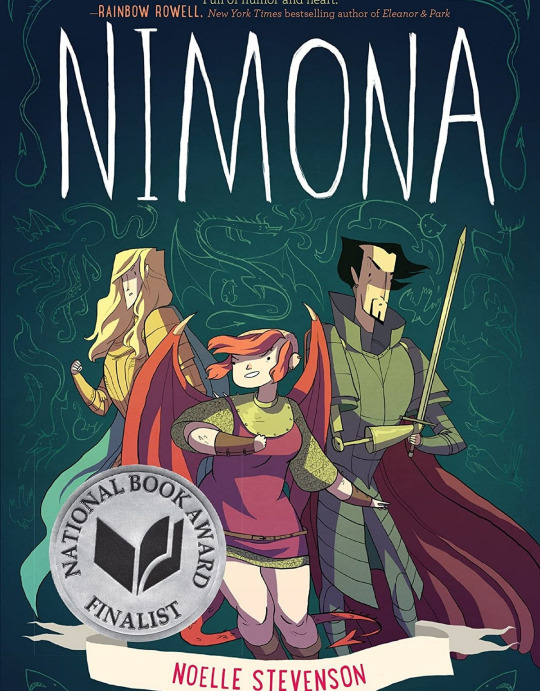
Nimona
Obviously I had to finally read Nimona. It’s been on my TBR for ages, and, like absolutely everyone else I think, I figured I had better read it now that the movie is out. I enjoyed both the comic and the film very much! It was interesting to see two slightly different takes on the same narrative, and I think both expressed the point they were trying to make very well. I honestly couldn't say which version I enjoyed more. I doubt I have anything to say that someone else hasn’t said much, much better, so I'll leave it with that.
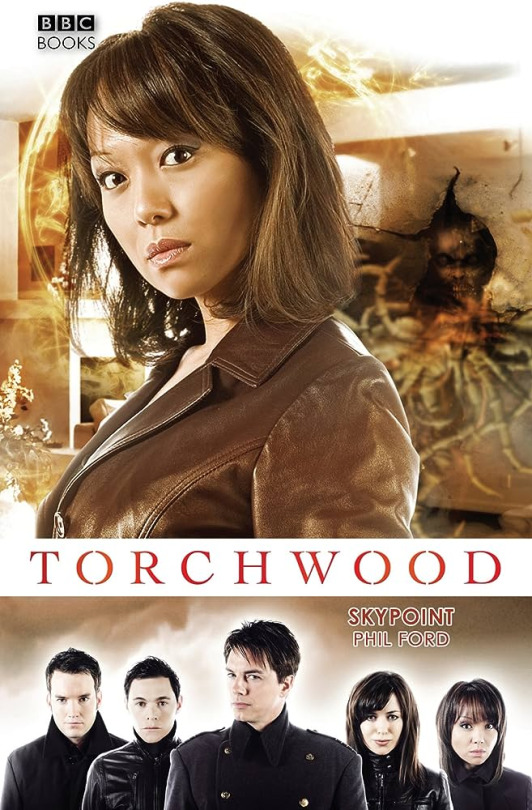
Torchwood: Skypoint
One of the better Torchwood books I’ve read so far, I think! It had some pretty solid characterization tbh. The story wasn’t anything mind blowing, but a survival adventure in a high tech apartment was a fun setting, and I am literally never going to say not to a fake marriage plot line 👀 so a story about Owen and Tosh going undercover as a newly-wed couple in a sinister apartment building that might be eating its residents was just plain old fun. It also delivered me some truly delicious Tosh/Owen angst. Mwah. It was all around a pretty darn good Owen book, which he deserved after being slandered so badly in Something in the Water. Though I was a little disappointed by how Tosh was handled — I kept expecting her to have a bigger role than she really got by the end.

Yuri Bear Storm v1
…I have no words. I bought this one on a whim because the description on the back made me laugh:
Every night, 16-year-old Kureha has a strange dream involving lilies, storms, and... her classmate Ginko as a bear?!
At school, Kureha's unassuming personality and looks render her practically invisible. Sometimes, it feels like no one notices her at all... until cute and energetic Ginko asks Kureha to talk privately one day during lunch. Maybe she really is a bear... or maybe she's just got a crush on Kureha!
but frankly there were too few bears. I thought I was getting a bear-themed magical girl book with lesbians. I have no idea what I actually got. You can tell there’s some sort of metaphor at work here — and I’ve got an Honours Degree in English Literature, dragging bullshit metaphors out of the text kicking and screaming is like my whole thing — but I’ll be damned if I could actually tell you what it is. It’s either wildly inconsistent and deranged, or genius. Or maybe there's no metaphor at all and the authors just really wanted to draw bear ears and panty-shots *shrug* I cannot emphasize enough how little sense this book made. Every time I thought I maybe had a handle on things it got progressively more inscrutable, it was actually rather impressive.

May get the second book, we’ll see how weak my resolve is not to waste my money.
#book review#book reviews#a marvellous light#nimona#torchwood#doctor who#queer lit#queer books#canlit#canadian literature#grandmaster of demonic cultivation#american girl#a rover's story#kit kittredge#addy walker#yuri bear storm#manga#yuri manga#paternoster gang#chatter
33 notes
·
View notes
Note
Hello mr whiscash. I read your tags on a post about how non fiction books slap and I'd like to ask *where* exactly you started reading? Cause there's some topics I'm interested in but I don't know how to find books about them. Like, did you follow a recommendation from someone else? Did you go to a library and ask? Did you google "cool book about space" and click on the first bookstore link you found? Thank you.
(Sorry if this response is a few days late I didn't know the question came in lmao)
So, I can only speak to my experience, but I started looking for astronaut nonfiction because I reached a point in watching documentaries where I was getting a lot of repeat information. I knew the only way I was going to learn more about the subject, and to the level of detail I was looking for, by going to books.
To start with, what I did was find a web page from NASA that listed all of their known biographies, memoirs, and autobiographies written by/about astronauts. I also looked for books that had been used as sources for documentaries or movies. This provided me with a pretty thorough list of reading material. Obviously I'm not going to read all of them because there's like a hundred, so instead I pick the ones that interest me the most via subject matter, either based on what astronauts are involved or what the mission entailed.
What I also did was found different books on the same subject so I could see different points of view. A lot of these guys had strong personalities and differing opinions on events that happened. I wanted to learn about the drama in Apollo 7, so I wanted a couple different books to formulate my own opinion on events from different sources.
I also went to a number of museums and found books that interested me but I was unwilling to pay full price for in their gift shops. The Smithsonain air and space museum had a fantastic collection of books and it was there I learned about Fred Haise's memoir, which I will absolutely be buying after my next paycheck.
From there, once I had a list, I went to Libby and looked to see where I could find audiobooks of the ones I was the most interested in. It's a fairly niche interest subject so my local library had literally none, but my friend lets me use her Boston public library card so there's more options there but still not everything. It did have a lot of the big ticket ones like First Man and Moon Shot, both of which I listened to. If you attend a college, there's a chance they may have a greater selection of nonfiction than a regular library since students use them as sources, and some college libraries do let the public browse books so you might luck out there.
For the ones that weren't on Libby, I turned to thriftbooks. My coworker who leads a book club swears by thriftbooks so I knew it was bound to have a lot going on and indeed it has had nearly every astronaut book I've looked for, including ones that have been out of print for years. I have gotten everything from there, ranging from a brand new signed copy of Gene Kranz's memoir (I know he's not an astronaut but he was heavily involved in the space program) to a former library copy of Wally Schirra's book to a 1963 copy of We Seven. Nearly everything is pretty cheap except for certain extremely niche finds - I love you Gus Grissom but I'm not spending $40 on your out of print book from 1968. Someday, maybe. But not today.
There's a few I've chosen to get from other sources too, like Charlie Duke's book Moon Walker which I bought directly from Duke himself. I've been eyeing a copy of Alan Bean's book Apollo: An Eyewitness Account on ebay for a while but i want a verified signed copy and theyre expensive lmao. But for the most part literally everything I have I got off thriftbooks.
I would also suggest if you have something you're interested in to find websites or blogs or reddit communities that may have discussions about books about it. I got Deke Slayton's memoir because I saw someone talking about it on reddit and it was one of my favorite astronaut books I've read so far. I found out about We Seven and Schirra's Space from some guy's fan website about Wally Schirra. And obviously not everything is going to have a webpage like NASA does, so communities are going to be a good bet to start out with. That and seeing what books are recommended under listings on thriftbooks since they're usually at least semi relevant to the subject.
One thing you can also try and do is on Wikipedia looking at the sources it takes and seeing if any books are referenced. It's not always gonna work, but it might get you started.
Nonfiction books are absolutely slept on. They're like the best way to learn about a subject especially once you've run out of documentaries. I wish you good luck on your pursuit of knowledge.
5 notes
·
View notes
Note
this is a bit of a weird or maybe personal question but. okay so my baba (ik baba means dad, hes my grandpa but irl i call him "baba [name]" so) is from iraq. he wanted to raise his kids (my mom + aunts) as american as possible. because of that me and my mom have always been seperated from our culture. do you know how i can start reconnecting with that? if there are any authors or movies or anything to help me connect?
hii not weird!! glad to see you trying to reconnect. tbh my story is similar to yours. my mom did live in iraq for a good portion of her life before immigrating here, but she never put effort into teaching us the culture (which i don’t blame her for!! she was a busy single mother of two, so i get it). my bibi also didn’t really try to teach us much, aside from cooking iraqi cuisine haha (i will always die by that iraqi cuisine is the best cuisine). i’m basically hopeless when it comes to iraqi media. i literally only know about kadim al-sahir (famous iraqi singer, would absolutely recommend him) bc my mom probably continues to have a crush on him to this day.
what got me to reconnect was visiting baghdad last summer by myself. i just made the spontaneous decision and went w it, rather than get pushed by anyone to do it. i still have relatives in iraq, so that’s why it was feasible for me to actually go (i kind of hopped between jordan and iraq bc i have family in both countries). it was a magical experience honestly, still super surreal to me. people speaking arabic on the streets, arabic music playing in restaurants, even got to see so many iconic landmarks… actual dream come true. but i haven’t put much effort into exposing myself to iraqi media yet, so that’s the next step. i think im just gonna start w a history fiction novel or nonfiction history book of some sort tbh. i’m more interested in iraqi culture beyond islam than i am in the religion, so im probably not a good reference if you wanna know more about the religion too.
w all that said!! i’ll ask my mom/bibi and let you know if they have any movie recs :) my bibi is a literal cinephile, so i’m sure she’ll have many actors/singers up her sleeve lmao. so cool of you to be putting effort into this 💕
#so cute that u call ur gpa ur baba… my mom told me that when i was a baby i did the same thing w her dad#and he would always correct me 😭😭 he’d be like no!! it’s jidoo!!!#ask
10 notes
·
View notes
Text
𝐏𝐄𝐎𝐏𝐋𝐄 𝐈'𝐃 𝐋𝐈𝐊𝐄 𝐓𝐎 𝐆𝐄𝐓 𝐓𝐎 𝐊𝐍𝐎𝐖 𝐁𝐄𝐓𝐓𝐄𝐑!


alias / name: lala / luka
pronouns: they / them
birthday: august 20th
zodiac sign: leo
height: 5'9
hobbies: writing, sewing, reading, video games, muay thai
favorite color: reds, purples, and black
favorite book: this is hard, because i have so many that i like. i also think i've told people my fave book and i forgot what i told them. anyway, i'll give a few of my faves: any of edgar allen poe's short stories (i really enjoyed reading these in high school and still love reading them), g.ood o.mens (or anything by n.eil g.aiman really), educated by tara westover (my whole immediate and extended family ended up reading this), and mexican gothic by silvia moreno-garcia (good spooky book) are some that stick out to me from my reading the last few years.
last song: stayin' alive by bee gees
last film / show: surprisingly not OP, but derry girls
recent reads: g.ood o.mens, circe, were the most recent but i'm currently working on neverwhere, light from uncommon stars, and alone on the wall (one audiobook, one fiction, one nonfiction)
inspiration: music is a big one for me, classic literature (some of poe's telltale heart is used as inspo for my Cora portrayal), but also a lot of irl people in my life get featured in my portrayals, or at least tidbits of them
story behind url: i was looking for new, shorter url and sev suggested this one because he had it saved before, and i liked it and went with it! (ty sev <3)
fun fact about me: i am working on my phd in plant pathology

tagged: i stole it from @kaizokugaris because i'm a terrible lil thief
tagging: @belovedcorvid , @enjomo , @kiriage , @ferromagnetiic , @enruiinas , @godthread , @climatact , @mingos , @notanuki & you!!
#❝ adhd thought dump ❞ — ooc#i just like talking about the books i like#aha#also i added the pronouns one#felt weird having a an 'about' dash game without that
8 notes
·
View notes
Text
hello all you beautiful people!
a little unknown fact about me: i love reading! i mainly read reference material and nonfiction, but i don't mind the occasional fiction! i have plenty of friends on here who like reading (after all, you're on my page!) and who love elvis, so i figured i'd make a compendium of books that were adapted into elvis' movies.
it will be organized by the movie / the year it came out, and the story / its author. i'll also include a little description of each.

-love me tender (1956) & the story of the reno gang: this movie was not based on a story, but actual historical events! the reno gang were a group of brothers who went around the midwest robbing trains. clinton reno was a real person, the youngest of the five brothers (his nickname was "honest", as he never got involved with any criminal activity pertaining to his brothers.)
-loving you (1957) & a call from mitch miller by mary agnes thompson: the movie was based on a short story by mary agnes thompson that was featured in the june 1956 edition of good housekeeping.
-king creole (1958) & a stone for danny fisher by harold robbins: king creole was the first of el's movies to be based on an entire book! the role was originally meant for james dean, and was set in the backstreets of new york city.
-flaming star (1960) & flaming lance by clair huffaker: this was one of two movies where the original author was involved in creating the screenplay.
-wild in the country (1961) & the lost country by j.r. salamanca: although some creative liberties were taken (el's character went from an artist to a writer and hope lange's character became a psychiatrist rather than a teacher), it still followed the same plot as the original novel. it was also the first to feature elvis on a published paperback.
-follow that dream (1962) & pioneer, go home! by richard p. powell: the novel is based on a family from new jersey (WOOT WOOT), and although technically based on the book, the movie takes many creative liberties to the point of it being almost completely opposite the original source material.
-stay away, joe (1968) & stay away, joe by dan cushman: this is what el considered his first "serious" role. although involving some incredibly racist stereotypes, it is rooted in some truth about elvis' lineage: his great-great-great grandmother was a cherokee woman named morning white dove, and some attribute his high cheekbones and striking features to his distant native ancestry.
-live a little, love a little (1968) & kiss my firm but pliant lips by dan greenburg: the movie, like follow that dream, was so loosely based on the book that it was almost completely opposite the original source material.
-charro! (1969) & charro! by harry whittington: this is the only "officially endorsed" book based on an elvis movie.
-the trouble with girls (1969) & chautauqua by day keene: this is my absolute favorite movie of all time, and ironically, there is no information about the book's plot. based on what i've gathered from other sources, it follows an almost identical plot to the movie. unfortunately, the author died 9 months prior to the movie's release.
-change of habit (1969) & title-not-available by richard morris and john joseph: according to wikipedia, change of habit was based on a story written by richard morris and john joseph. i've scoured the internet under both of those names, and found nothing! oh well.
i hope you all had as much fun reading this as i did writing this, and be sure to shoot me a message if you read any of these!
(...or if you find a reasonably priced copy of chautauqua.)
-all my love, calla xx @kiankiwi @arianatheangel-girl @mooodyblue
#elvis presley#elvis books#elvis cinematic universe#love me tender (1956)#loving you (1957)#king creole (1958)#flaming staar (1960)#wild in the country (1961)#follow that dream (1962)#stay away joe (1968)#live a little love a little (1968)#charro! (1969)#the trouble with girls (1969)#change of habit (1969)
13 notes
·
View notes